:max_bytes(150000):strip_icc():format(webp)/best-sports-movies-creed-michael-b-jordan-cbca95120e5243edb7eca00403eaa626.jpg)
A Guide to Exploring Googles Podcast Platform

A Guide to Exploring Google’s Podcast Platform
Google’s proprietary podcast-listening app, Google Podcast, is one of the few podcast apps on the Play Store, with an audience base of more than 100 million. And for a good reason: Google Podcast does podcasts as YouTube does with videos. It’s simple to use, free to all, and features podcasts on the news, captivating stories, and educational content that resonate with all.
Read on to find answers to questions like what is Google Podcast App? How does Google Podcast work? Its features, interface, and some of the best podcasts are featured on the platform. As a bonus, we will also provide a step-by-step guide on creating your own podcast and submitting it to Google Podcasts.
- Best Podcast on Art & Culture
- Best Tech Podcasts
- Best Talkshow and Interview Podcasts
- Best Health Podcast
- Best History Podcast
- Best Informative Podcast
- Best News & Politics Podcast
- Best Sports Podcasts
- Miscellaneous Podcasts
- Movies, Music, and TV Podcasts
Part 1. What is Google Podcast App?
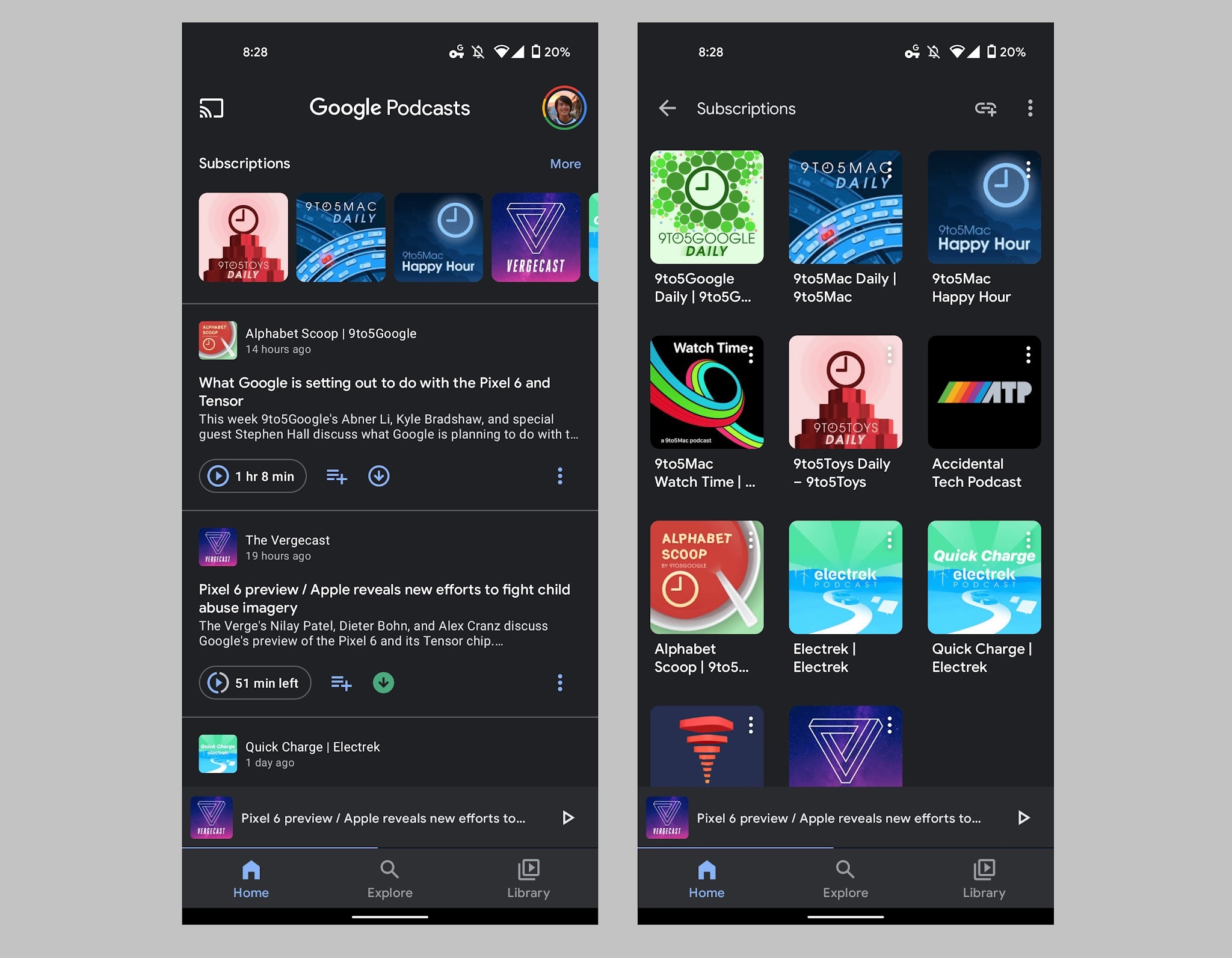
Google Podcast (formerly Google Play Podcast) is Google’s proprietary podcast-listening app. It comes pre-installed on some Android smartphones and all Pixel editions. Even Apple users can install Google Podcasts via the App Store. It’s free and lets you discover, stream, and download podcasts.
Google Podcast has already hit 100 million downloads, an indication of its rising popularity both among content creators and users. Users prefer it for its navigable, search-aligned, minimalist interface. And prominent podcast creators are focusing on the app to make their episodes accessible to millions of Android users.
Part 2: Google Podcasts Features
Compatible with Android, iOS, macOS, Windows, Blackberry, and ChromeOS, Google Podcast is relatively a novice compared to dedicated podcast services. Still, Google Podcast seamlessly incorporates nearly every feature one needs to listen to podcasts.
Search and Personalized Recommendations
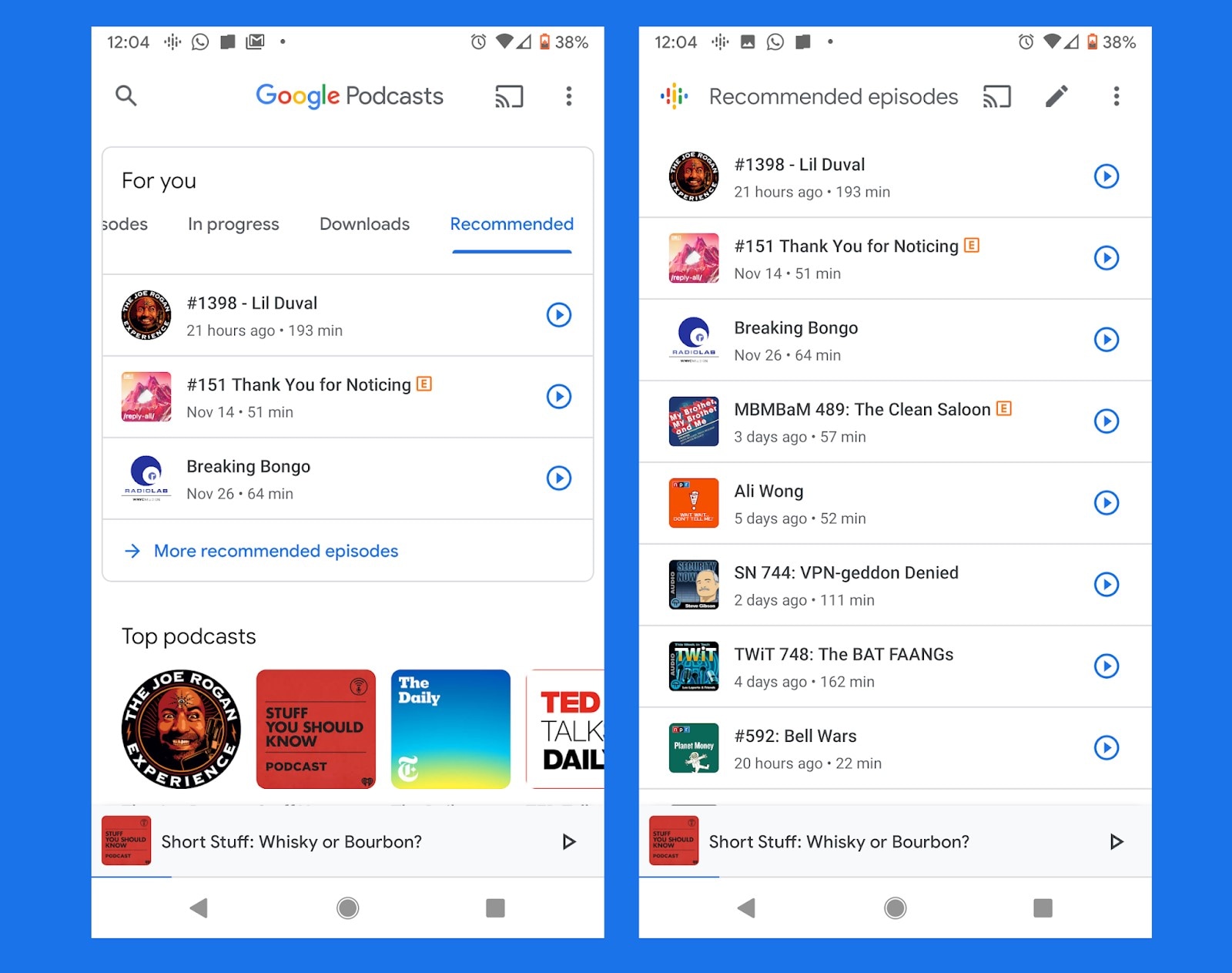
The most significant feature of Google Podcast is its algorithm-based recommendations that connect users with shows that suit their listening habits. As a new user, you might want to explore new topics and taste new concepts, and that’s where Google Podcast will impress you. But even more than that, it will automatically recommend suitable podcasts depending on your interest and previous engagements with the platform.
Google Podcast app covers a plethora of podcasts, so you do not have to switch to other platforms to discover something new or topics you love.
Free and Ad-free Experience
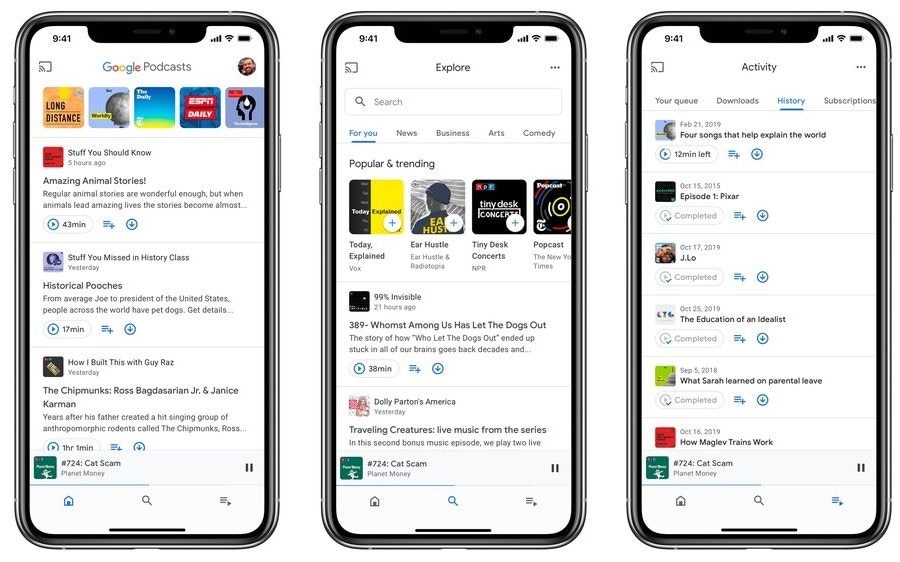
Google Podcast is completely free in a world where podcast platforms demand high charges for an ad-free and high-quality experience. All you need is a Google account to register and listen to anything available on the platform. In addition, podcast creators have to qualify to Google’s standards before submitting the podcast on the forum, ensuring you will listen to the podcast in high quality.
Clean UI
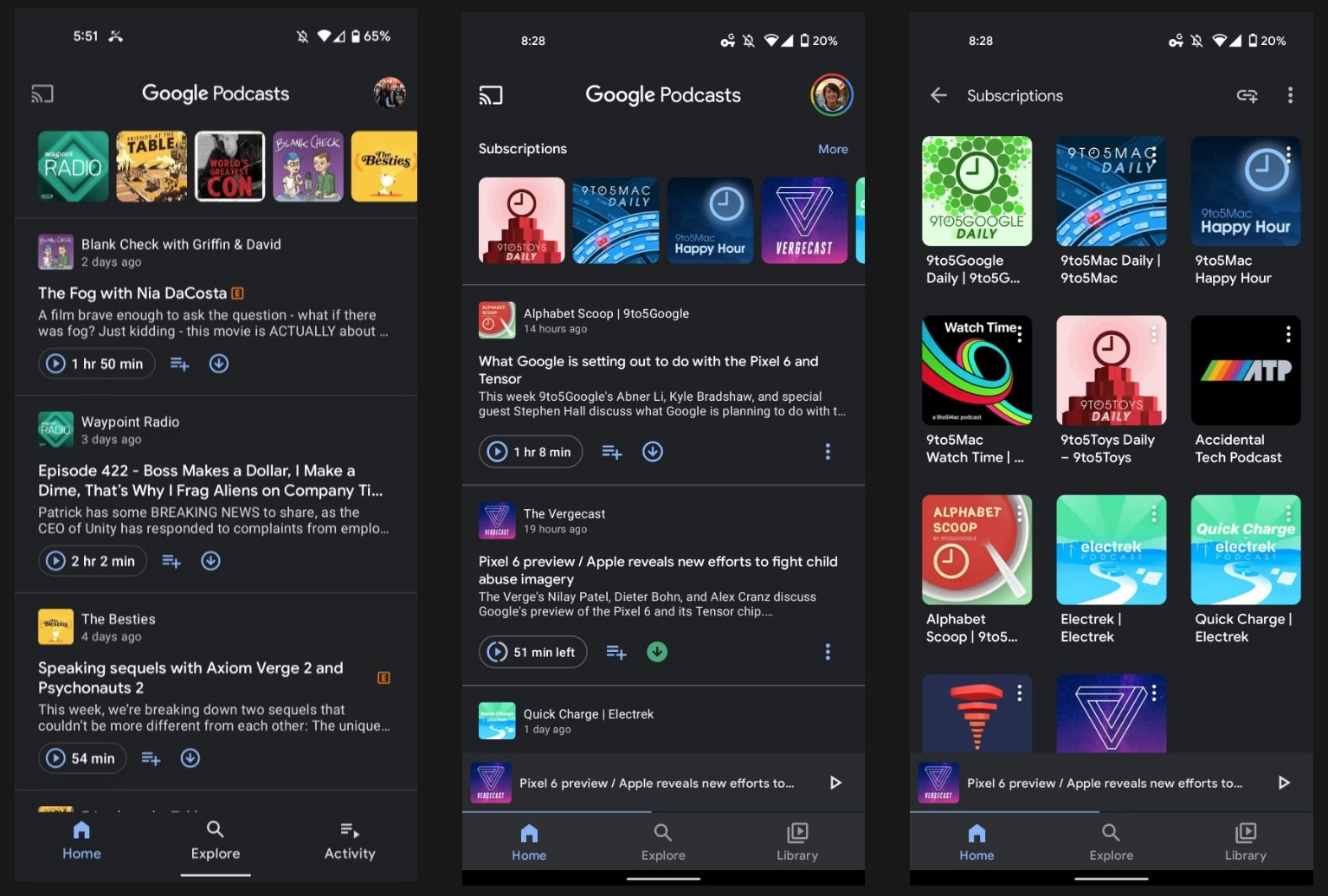
Whether you’ve used a podcast platform before or not, the Google Podcast platform will seem familiar. Once you sign up, the interface will welcome you with podcasts covering all genres arranged neatly in a grid view for convenience.
In line with simplicity, the Settings option in the Google Platform app is as basic as basic gets. Plus, it allows you to conveniently organize your subscriptions and downloads via the Library tab.
One more thing: although Google Podcast is primarily designed for Android users, its counterparts on other OS, like Apple, Web, and macOS, remain simple and easy to use.
Auto-downloads, Sleep Timer, and Seamless Switch Between Devices
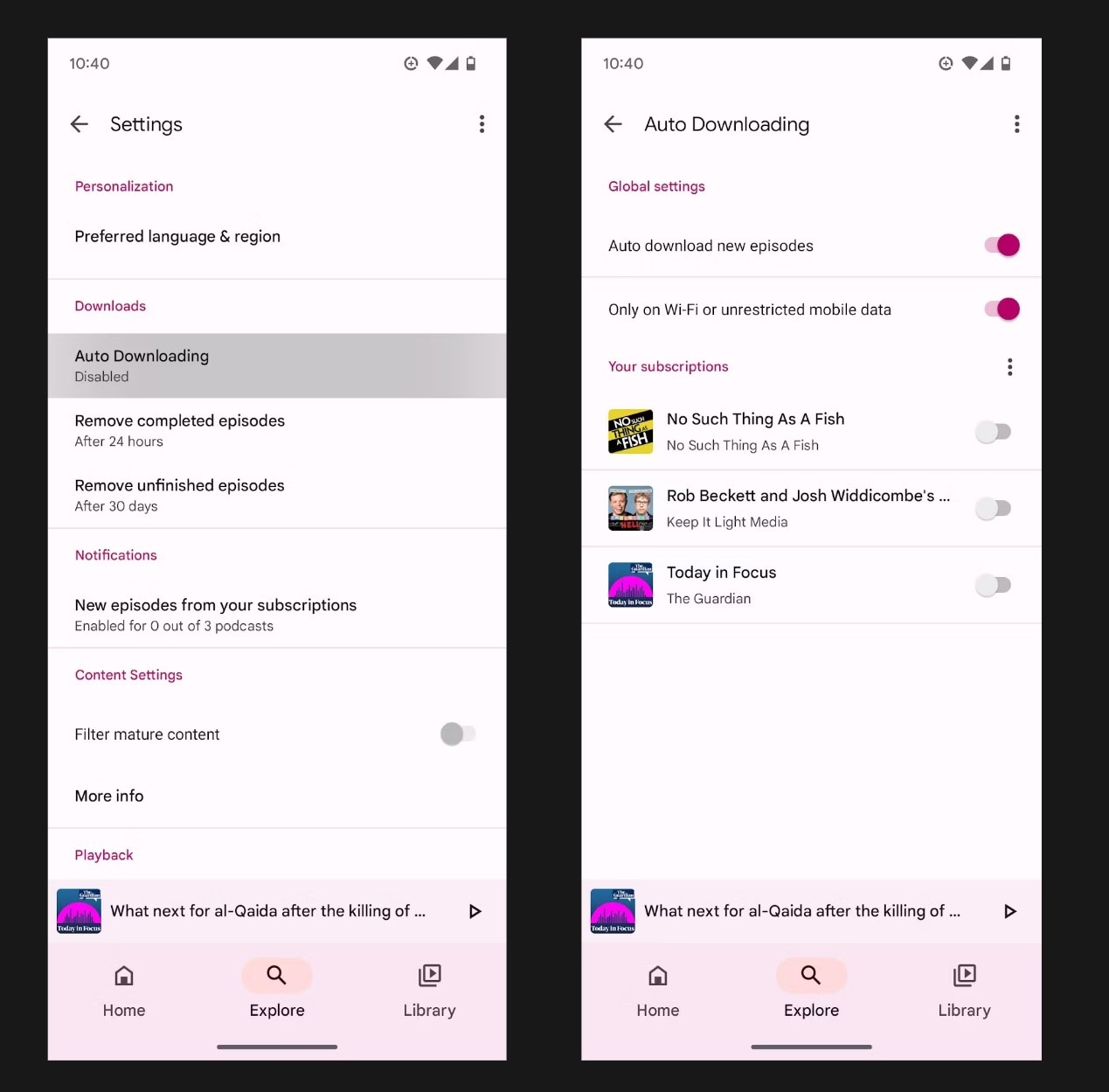
Google Podcast automatically downloads the podcasts you love and removes them after you’ve listened to the particular episodes.
Another significant characteristic of the Google Podcast platform is its intuitiveness. For instance, many podcast platforms do not automatically switch to the next episode, but you do not have to worry about such aspects with Google Podcast. You can also put a sleep timer.
Given that it’s available on all primary OS, you can seamlessly switch from one device to another. Not to forget, you can search for the podcasts using Google search or your Voice Assitant.
Part 3: How Does Google Podcast Work?
Now that you know the Google Podcast app and its features, here’s how to use the platform. Assuming you have downloaded the Google Podcast platform on your device and signed in using your Google account, we will now show you how to search and start listening to podcasts on the platform:
Step1 Add Your Favorites
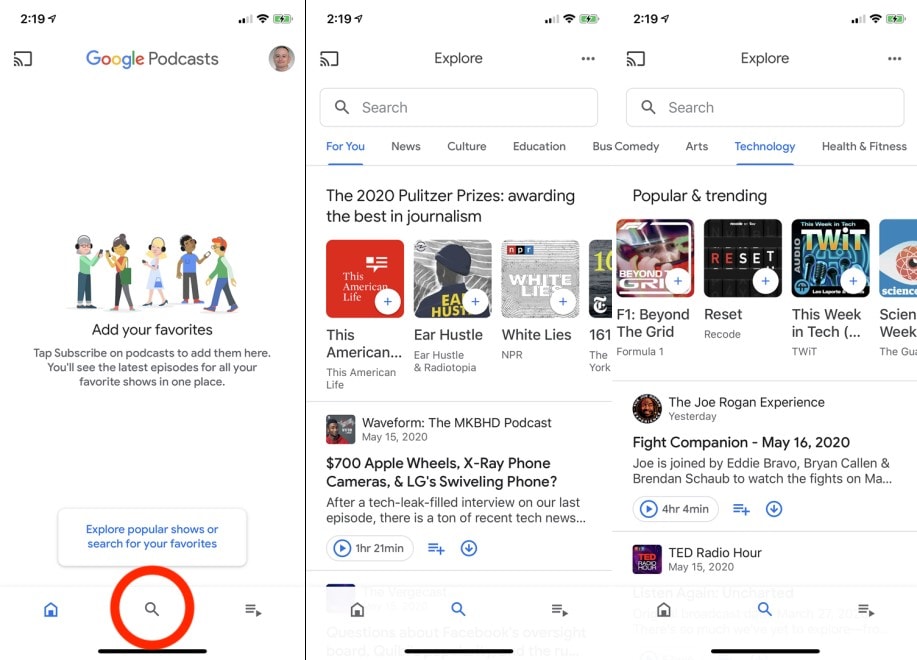
Once you register on the Google Podcast platform, the app will ask you to explore popular shows or search for your favorites. Once you click on the Explore option, a new screen with categories listed will be shown in the top menu, like For You, News, Culture, Education, Comedy, Technology, and more. Tap on the categories to view the features of podcasts in each category.
Step2 Search Podcasts Manually
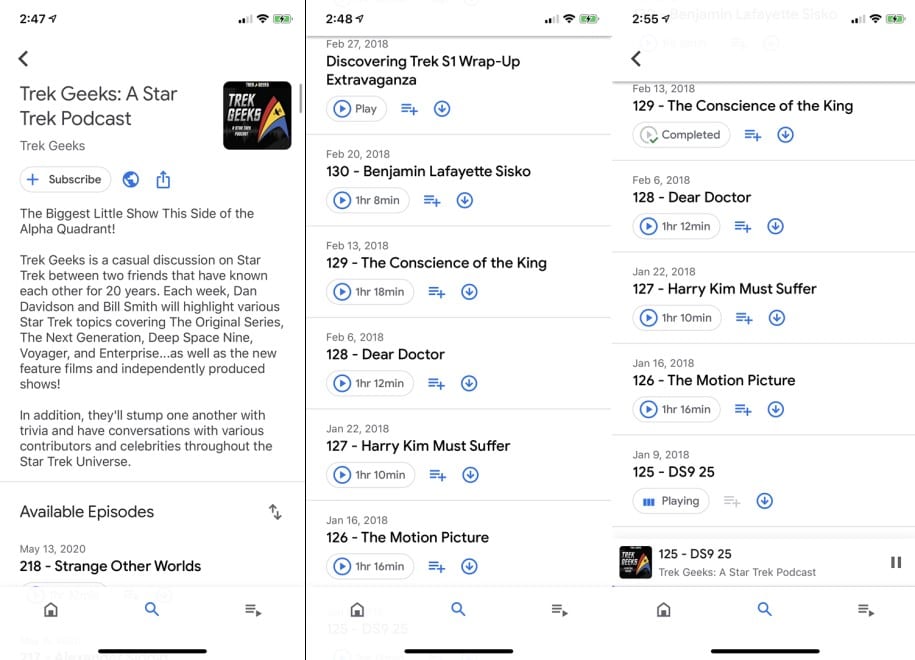
Click on the Search icon and then start typing the name of the podcasts you follow to locate them quickly. Next, tap on the desired podcasts from the search results and scroll down to view individual episodes. Finally, you can click the Subscribe button to follow the channel. The Play icon allows you to listen to the episodes.
Step3 Controls in the Google Podcast app
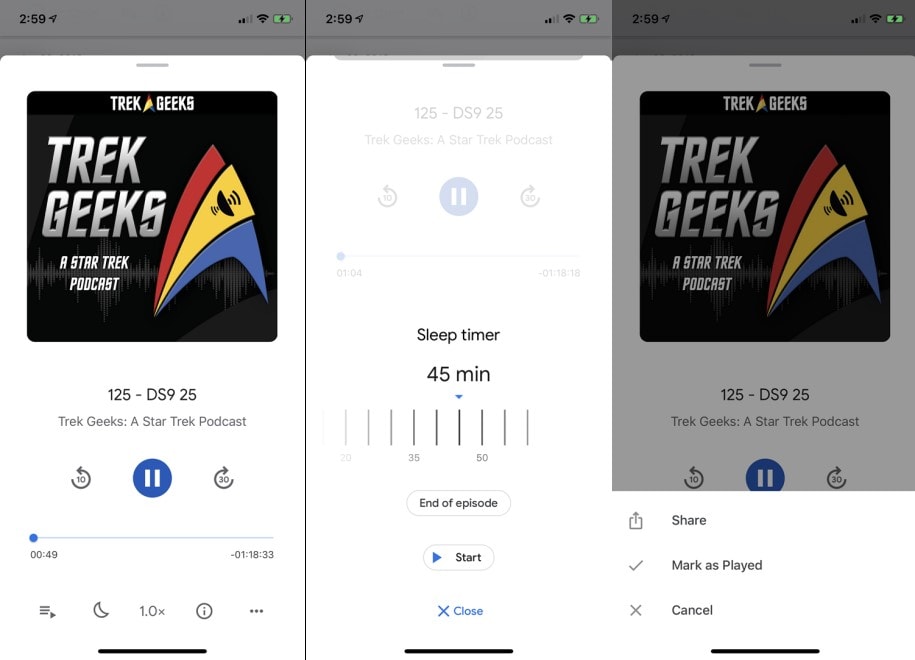
Once you play an episode on the Google Podcast platform, you will be taken to full-view mode. The Pause icon allows you to interrupt the episode. Plus, the 10 seconds rewind button allows you to go back and listen to something again.
Whereas the 30 seconds forward button will enable you to jump 30 seconds ahead in the episode, you can use this icon during the introduction or in-episode ads. The Speed icon lets you change the playback speed from 0.5x to 3x.
The “half-moon” icon allows you to set a sleep timer. And the “Info.” icon allows you to read about the individual podcasts (if published by the creators). The “ellipsis” icon (three dots) enables you to mark the episode as played, so it will not recommend the particular episode again. And the share button allows you to share the episode with others.
Step4 Queues and Downloads menu in the Google Podcast App
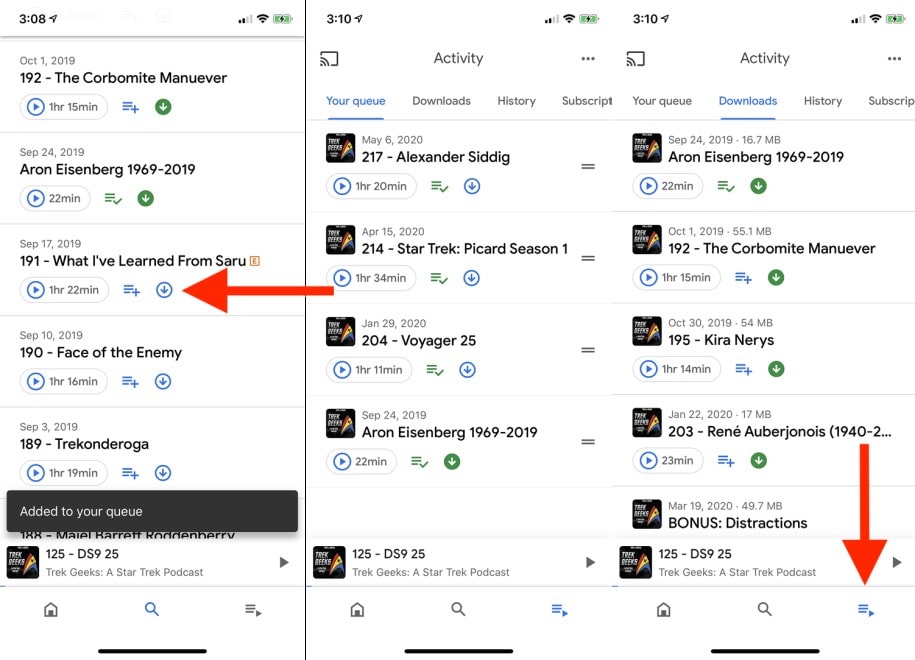
Given that the Google Podcast is a free platform, you can download all the episodes and listen to them offline. To download the episodes, click on the Download button. Once downloaded, you can access them via the three-lined icon from the bottom-right of the interface. Within the Library tab, you will also find the History tab, which allows you to access all the episodes you’ve previously listened to.
Step5 Settings in the Google Podcast platform
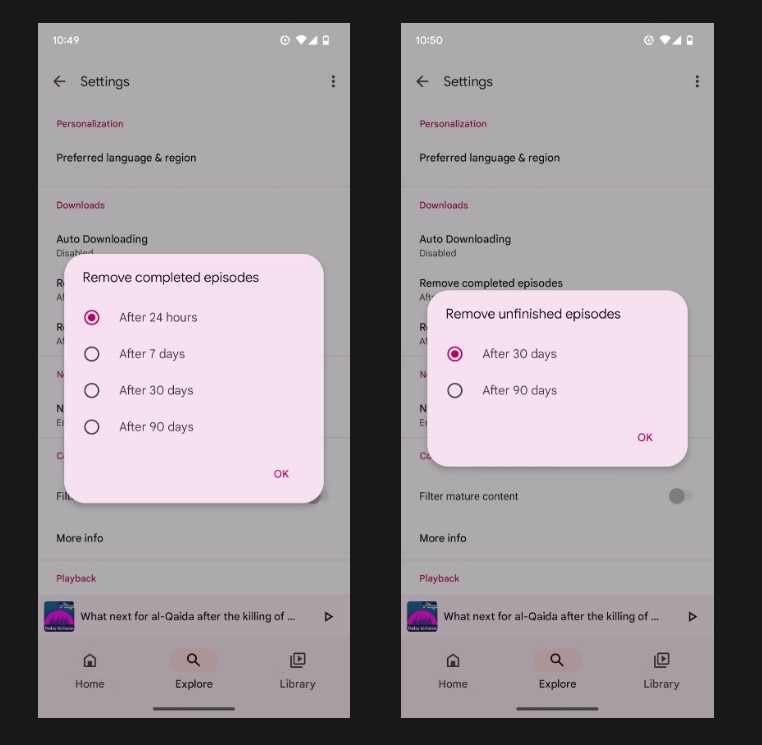
Click on your image at the top-right corner to access the Settings in the Google Podcast app. Under the Google Podcast Settings page, you will find options for Downloads, Notifications, Playback, and more. For instance, Auto-downloads allow you to control the quality of the downloads and when to download (like over mobile data or Wi-Fi).
Plus, you can choose when to auto-delete the episodes, like after a week, and so on. Other options like Playback allow you to decide whether to Auto-play the next episode or not.
Video Tutorial of the Google Podcast App
Here’s a video tutorial 6 Months Later Review Channel: How to Use the New Google Podcasts (2020)
In the video, Josh Teder familiarizes you with Settings, Browse, Library, Subscriptions, and other features of the Google Podcast platform.
Part 4: 10 Popular & Trending Podcasts on Google Podcast App
Now that you have a complete idea about the Google Podcast app, here are some of the best podcasts featured on the platform. Of course, given the popularity of podcasts, the choices are endless. But it is vital to retain that with great options comes great mediocrity.
That is why we asked all our team members to contribute and came up with this short list of best podcasts on the Google Podcast app that covers all genres. So, whether your interests lie in tech, true crime, pop culture, or comedy, you will find something that educates and entertains you.
1. Best Podcast on Art & Culture
Host: Jennifer Dasal
Number of Episodes on ArtCurious: More than 100.
Episodes Duration: 15-25 minutes
Upload Frequency: Weekly

Discussing the unexpected, the slightly odd, and the strangely wonderful in Art History, ArtCurious is nothing like an art class where terminologies are thrown and linear perspective is discussed. Instead, it discusses the juicy stuff!
On ArtCurious, you will find hidden truths about famous artists and creators, like why Van Gogh committed suicide. In addition, you will learn about the strange habits of revolutionary artists. If you are an art enthusiast and want to explore the unseen corners of art history, ArtCurious will fill your thirst.
2. Best Tech Podcasts
Host: Dan Moren and Mikah Sargent + 2 Guests (every week)
Number of Episodes on Clockwise: More than 400.
Episode duration: 30 minutes
Upload Frequency: Weekly
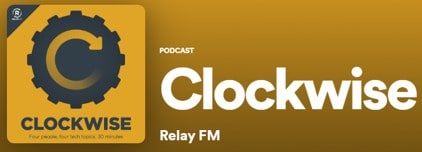
Dan Moren and Mikah Sargent invite two guests each week to discuss tech-related topics to inform, educate, and make aware of the not-so-tech generation. If you struggle with technology, like creating a good password, optimizing screen time, etc. Also, Clockwise is one podcast that can be the cure. It is important to note that Clockwise does not necessarily discuss heavy-tech stuff; instead, it is intended for the tech illiterates to make their life easier.
3. Best Talkshow and Interview Podcasts
Host: Terry Gross
Number of Episodes on Fresh Air: Daily since 1993.
Episodes duration: 45 minutes
Upload Frequency: Daily

Terry Gross, a famed-journalists and talk show host since the 90s, continues to feature weekly episodes covering present-day musicians, actors, producers, athletes, and artists.
On Fresh Air, you will discover exciting stuff about celebrities and find answers like how fame is a challenge in the social sphere and many more unusual things that you won’t find on any other talk show. Terry Gross interviews a single guest for about 45 minutes daily and indulges audiences with what’s happening worldwide.
4. Best Health Podcast
Host: Andrew Huberman
Number of Episodes on Fresh Air: More than 100.
Episode duration: 2 hours to 4 hours.
Upload Frequency: Weekly

Andrew Huberman, Professor of Neurobiology and Ophthalmology at Stanford School of Medicine, discusses the brain and its connection with body control. The episodes of Huberman Lab are long, ranging from 2 to 4 hours. So, if you want to change your habits and learn about nutrition, how to sleep, and more, Huberman Lab is the perfect addition to your Monday schedule.
5. Best History Podcast
The Bowery Boys New York City History
Host: Tom Meyers, Greg Young
Number of Episodes on Fresh Air: More than 400.
Episode duration: 1 to 2 hours.
Upload Frequency: 15 days.

American history is deeply rooted in the streets of New York City. The Underground Railroad, the elevated railroad, and the Hudson River: Host Tom Meyers and Greg Young discuss the 400 years of History of New York City. It discusses the famous leaders, the strange, and the myths created over the years and presents these stories via action-packed episodes.
6. Best Informative Podcast
Host: Stephen J. Dubner
Number of Episodes on Fresh Air: More than 500.
Episode duration: 30 to 60 minutes.
Upload Frequency: Weekly

Hosted by Dr. Stephen J. Dubner, Freakonomics Radio reveals the hidden sides of things. The things you think you know or you think you do not have to know, Freakonomics Radio will introduce topics that are typical for you and tell interesting stuff that amazes you.
It also informs you about things you might ignore and makes you more aware of everything. The best thing is Dubner invites Nobel laureates and provocateurs, intellectuals and entrepreneurs, and even underachievers to learn about things from all perspectives.
7. Best News & Politics Podcast
Host: Nate Silver
Number of Episodes on Fresh Air: More than 500.
Episode duration: 30 to 60 minutes.
Upload Frequency: Weekly

A subsidiary of ABC News, FiveThirtyEight Politics uses data and evidence-based knowledge to inform, educate, and make people aware of the current political situation across the 50 States. It’s suitable for anyone interested in knowing the truth of today’s American politics and the difference between the real truth and the created truth.
8. Best Sports Podcasts
Host: Bill Simmons
Number of Episodes on Fresh Air: More than 100.
Episode duration: 30 to 60 minutes.
Upload Frequency: Monthly
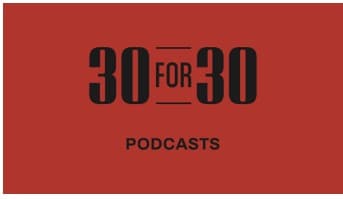
30 for 30 comes from the acclaimed makers of the 30-for-30 film series. Like documentaries, the 30 for 30 podcasts discuss sports legends, their stories, and unheard things about them. Beyond being informative, 30 for 30 also teaches you to explore sports and adventures. Even if you do not like sports or are not a football fan, you will surely enjoy tuning in to 30 for 30 episodes and getting lost in the busy lives of the sports legends.
9. Miscellaneous Podcasts
Host: Dan Schreiber, James Harkin, Andrew Hunter Murray, and Anna Ptaszynski.
Number of Episodes on Fresh Air: More than 400.
Episode duration: 1 hour.
Upload Frequency: Weekly
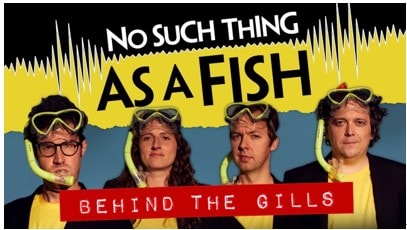
An award-winning podcast, No Such Thing As a Fish, comes from QI Offices and is about fun topics or something the creators have recently discovered. If you are looking for something fun yet interesting that informs and educates you, No Such Thing As a Fish is a perfect weekly podcast. The episodes are brief yet action-packed. And you will learn just about anything, from gorillas to caterpillars, on the podcast.
10. Movies, Music, and TV Podcasts
Host: Eric Molinsky
Number of Episodes on Fresh Air: More than 400.
Episode duration: 40 minutes.
Upload Frequency: Bi-weekly.
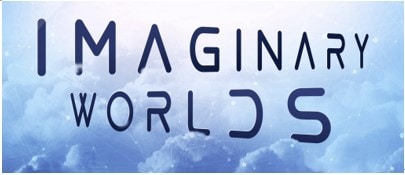
A podcast on science fiction, fantasy, and other genres, Eric Molinsky on Imaginary Worlds invite comic book artists, game designers, novelists, screenwriters, and filmmakers to discuss their crafts. Imaginary Worlds is just about what it sounds like, i.e., creating fictional worlds.
However, instead of just informing, it also guides artists and writers on how to form an imaginary world. A bi-weekly podcast, Imaginary Worlds is perfect for anyone interested in exploring new possibilities and imagining via different lenses.
Part 5: How to Record Your Podcast Show for Google Podcast App?
Google Podcast platform also allows individual creators to upload their podcasts to the platform and share it with the world. Given its popularity and user base, it’s one of the best ways to rise in the podcast realm and get that edge over others.
So, if you are interested in creating podcasts, here’s how to get started. For recording a podcast, you will have to use a third-party tool like Wondershare Filmora. Unlike Apple Podcasts, Google Podcasts does not provide a web studio to create a podcast on the platform.
Google Podcast is a podcasting directory; it does not store any audio files. Instead:
- It would help if you created the podcast somewhere else, like using Wondershare Filmora for recording.
- Upload it or store it in another location, like a Website. Or you can create a podcast-only RSS feed.
- And then submit the RSS feed to the Google Podcast Manager.
So, let’s first learn how to record podcasts using Wondershare Filmora.
Free Download For Win 7 or later(64-bit)
Free Download For macOS 10.14 or later
Wondershare’s Filmora is one of the best platforms to seamlessly record audio and video podcasts. Its straightforward and self-explanatory user interface allows even novices to record podcasts without going through any learning curve.
Besides recording, Filmora also allows you to edit audio and video. For instance, you will find dedicated toggles to limit background interferences, enhance microphone sound, fade in/out effects, and give access to several such features to create podcasts like a professional. You can also export the audio in the format that Google Podcast requires, like M4A, MP3, OGG, and WAV.
Key Features of Wondershare Filmora
- AI-based Silence Detection: remove moments of silence from the podcast with one click.
- Text to speech: transcript your text files into speech for the podcast.
- Speech to Text: transcribe their voice to subtitles in several languages. It increases accessibility, and users worldwide can understand your podcast seamlessly.
- Audio Ducking: Add background music to your podcast and manage the sound levels to create podcasts like professionals.
- Audio Visualizer: enhance your podcast episodes through audio-visualizing effects.
Here’s How to Create Your Own Podcast Using Wondershare Filmora?
Step1 Create a New Project
- Download the Filmora application.
- Choose to Create a New Project from the main interface.
- Import an image or stock footage from the library. (You can later download the podcast in audio format).
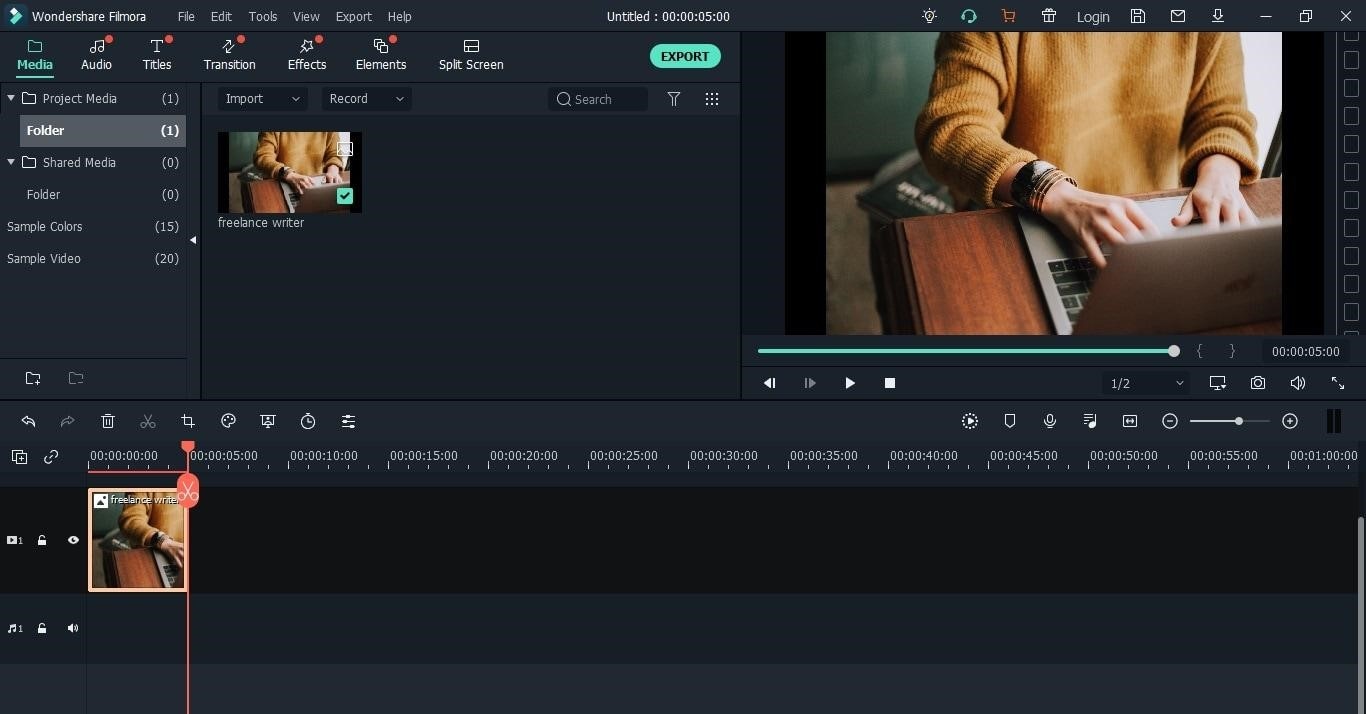
Step2 Start Recording
- Drag the media into the timeline and click the Record button to start recording.
- Click on Record Voiceover from the options.
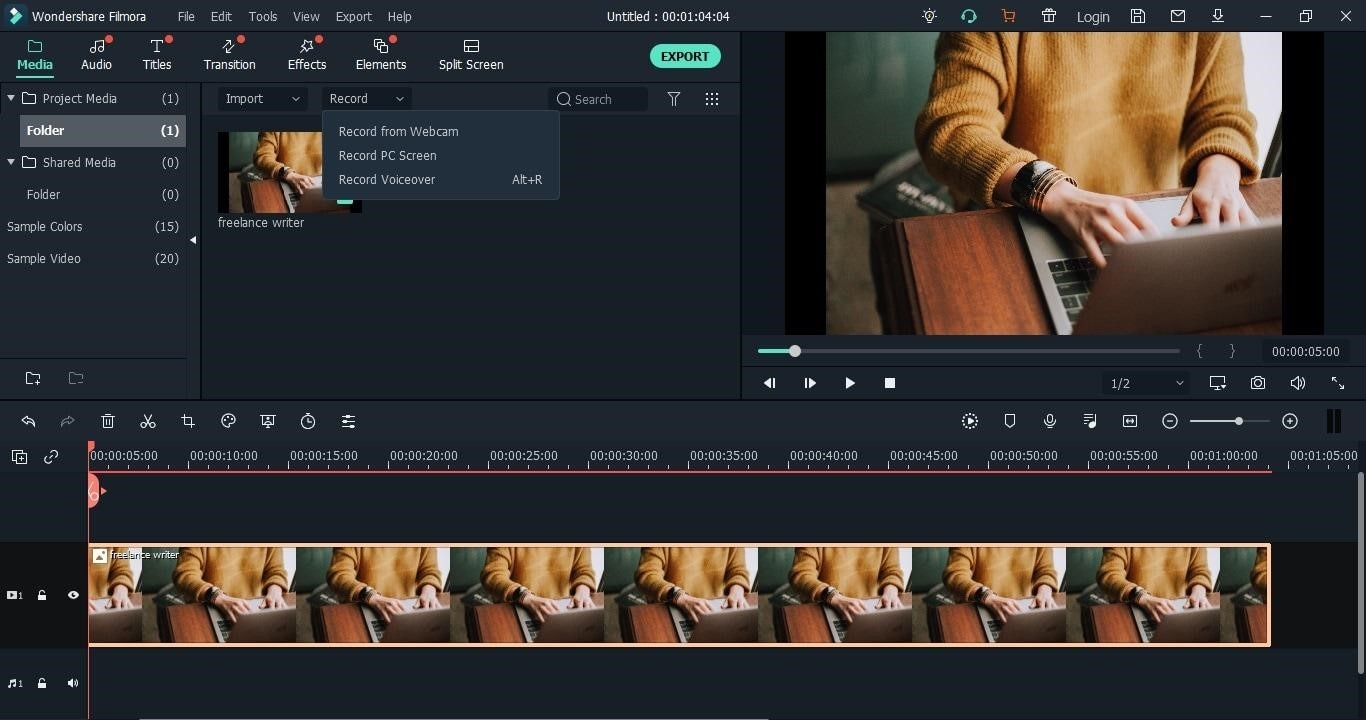
Step3 Set Microphone
- Connect your Microphone to the computer.
- Select the Microphone device.
- And click on the Red dot button to confirm the Voiceover recording.
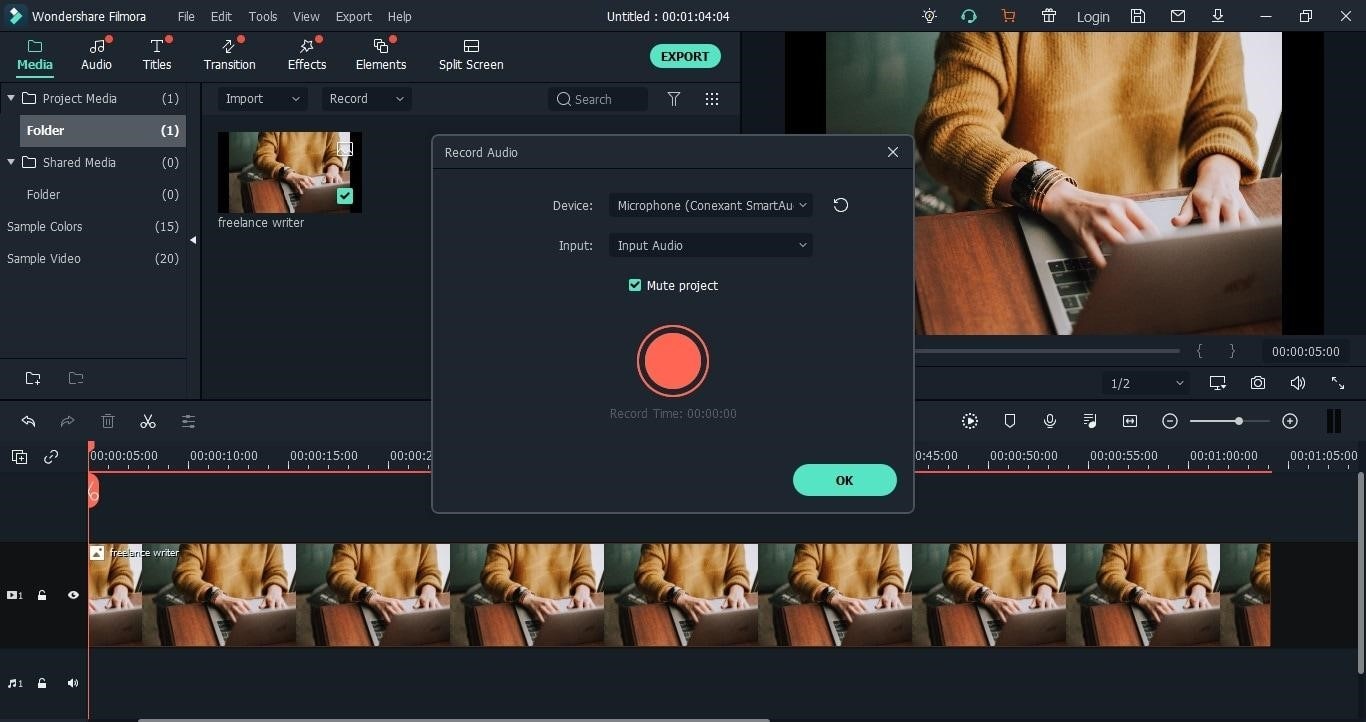
Step4 Record the Podcast
- Click on OK to proceed to record the podcast.
- Go through the outline you’ve prepared and discuss the topics for the podcast episode.
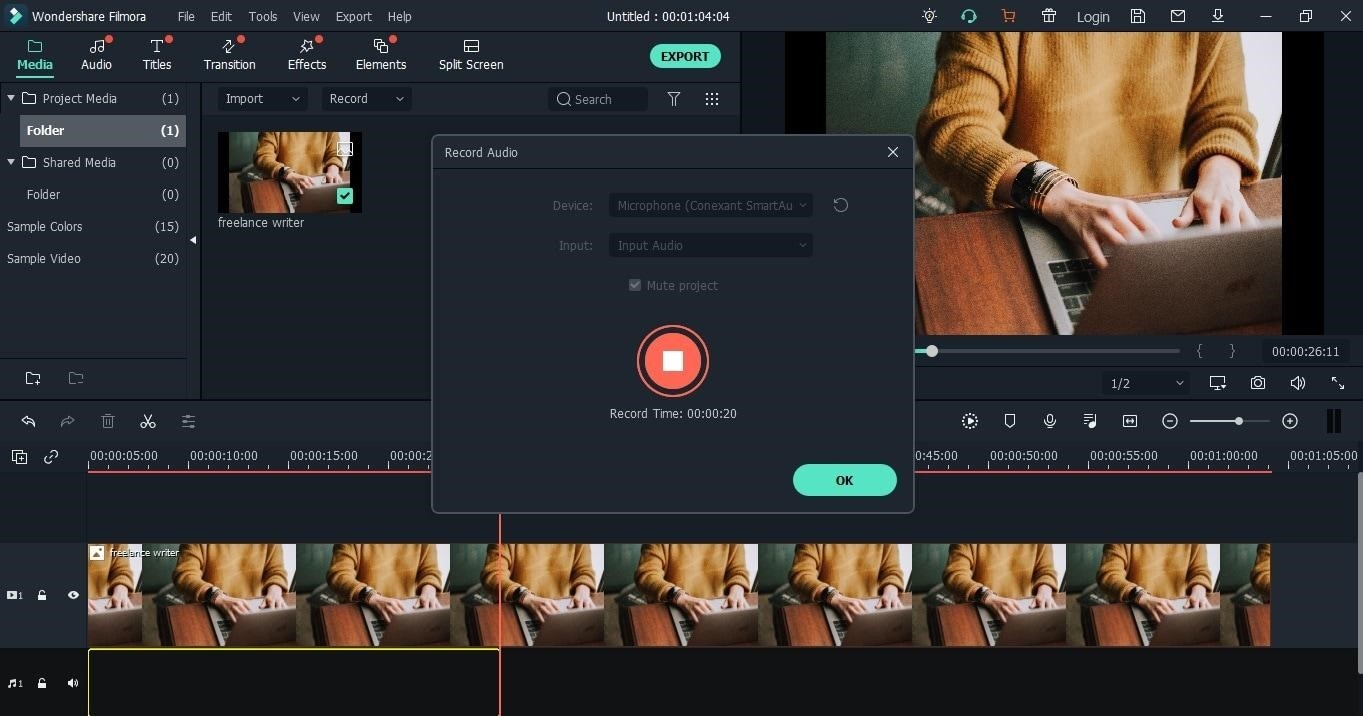
Step5 Export audio
Click on the Export button to download your project from Wondershare Filmora.
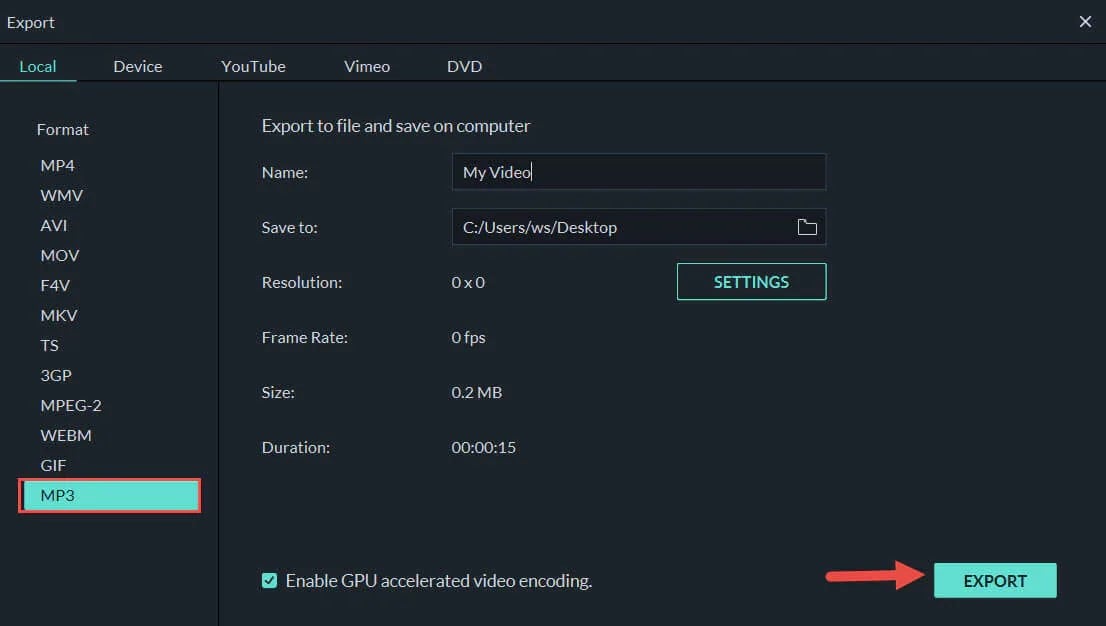
Now that you’ve recorded the podcast episode, you must create your podcast’s RSS feed. And submit the podcast RSS feed to Google Podcast Manager.
Hot FAQs on the Google Podcast App
1. Is Google Play the same as Google Podcast?
Earlier, Google featured podcasts on the Google Play platform (hence the name, Google Play Podcast). However, today Google Play does not feature any podcasts. So, you will have to choose Google Podcast
2. Where did Google Music Podcasts go?
Google shut down Google Music on February 24, 2021. However, it allowed users to move their podcasts and music files from Google Music to YouTube before that date. So, there’s a good chance you can find the earlier podcasts available on Google Music on YouTube.
3. Is Google Podcasts Ad-free?
Yes. Google Podcast app is entirely ad-free, and there is no subscription either. So you might see in-episode promotions that individual creators present, but there are no ads in the Google Podcast app.
Final Words
Hopefully, you now know the Google Podcast app and what you will find on the Google Podcast platform. As promised, we have also shown you how to use the Google Podcast app. Retain that you can use the Google Podcast app on all primary OS, including Apple and Android devices. The podcast recommendations in this guide are written to inform users about the great shows that resonate with them.
Another significant aspect of this guide on the Google Podcast app is creating your podcast and submitting it to the platform. Google Podcast, a directory, requires you to create your own podcast and submit the podcasts via RSS feeds. So, even if you want to make your podcast, you can use tools like Filmora and then publish it on Google Podcast to share it with the world.
Part 1. What is Google Podcast App?

Google Podcast (formerly Google Play Podcast) is Google’s proprietary podcast-listening app. It comes pre-installed on some Android smartphones and all Pixel editions. Even Apple users can install Google Podcasts via the App Store. It’s free and lets you discover, stream, and download podcasts.
Google Podcast has already hit 100 million downloads, an indication of its rising popularity both among content creators and users. Users prefer it for its navigable, search-aligned, minimalist interface. And prominent podcast creators are focusing on the app to make their episodes accessible to millions of Android users.
Part 2: Google Podcasts Features
Compatible with Android, iOS, macOS, Windows, Blackberry, and ChromeOS, Google Podcast is relatively a novice compared to dedicated podcast services. Still, Google Podcast seamlessly incorporates nearly every feature one needs to listen to podcasts.
Search and Personalized Recommendations

The most significant feature of Google Podcast is its algorithm-based recommendations that connect users with shows that suit their listening habits. As a new user, you might want to explore new topics and taste new concepts, and that’s where Google Podcast will impress you. But even more than that, it will automatically recommend suitable podcasts depending on your interest and previous engagements with the platform.
Google Podcast app covers a plethora of podcasts, so you do not have to switch to other platforms to discover something new or topics you love.
Free and Ad-free Experience

Google Podcast is completely free in a world where podcast platforms demand high charges for an ad-free and high-quality experience. All you need is a Google account to register and listen to anything available on the platform. In addition, podcast creators have to qualify to Google’s standards before submitting the podcast on the forum, ensuring you will listen to the podcast in high quality.
Clean UI

Whether you’ve used a podcast platform before or not, the Google Podcast platform will seem familiar. Once you sign up, the interface will welcome you with podcasts covering all genres arranged neatly in a grid view for convenience.
In line with simplicity, the Settings option in the Google Platform app is as basic as basic gets. Plus, it allows you to conveniently organize your subscriptions and downloads via the Library tab.
One more thing: although Google Podcast is primarily designed for Android users, its counterparts on other OS, like Apple, Web, and macOS, remain simple and easy to use.
Auto-downloads, Sleep Timer, and Seamless Switch Between Devices

Google Podcast automatically downloads the podcasts you love and removes them after you’ve listened to the particular episodes.
Another significant characteristic of the Google Podcast platform is its intuitiveness. For instance, many podcast platforms do not automatically switch to the next episode, but you do not have to worry about such aspects with Google Podcast. You can also put a sleep timer.
Given that it’s available on all primary OS, you can seamlessly switch from one device to another. Not to forget, you can search for the podcasts using Google search or your Voice Assitant.
Part 3: How Does Google Podcast Work?
Now that you know the Google Podcast app and its features, here’s how to use the platform. Assuming you have downloaded the Google Podcast platform on your device and signed in using your Google account, we will now show you how to search and start listening to podcasts on the platform:
Step1 Add Your Favorites

Once you register on the Google Podcast platform, the app will ask you to explore popular shows or search for your favorites. Once you click on the Explore option, a new screen with categories listed will be shown in the top menu, like For You, News, Culture, Education, Comedy, Technology, and more. Tap on the categories to view the features of podcasts in each category.
Step2 Search Podcasts Manually

Click on the Search icon and then start typing the name of the podcasts you follow to locate them quickly. Next, tap on the desired podcasts from the search results and scroll down to view individual episodes. Finally, you can click the Subscribe button to follow the channel. The Play icon allows you to listen to the episodes.
Step3 Controls in the Google Podcast app

Once you play an episode on the Google Podcast platform, you will be taken to full-view mode. The Pause icon allows you to interrupt the episode. Plus, the 10 seconds rewind button allows you to go back and listen to something again.
Whereas the 30 seconds forward button will enable you to jump 30 seconds ahead in the episode, you can use this icon during the introduction or in-episode ads. The Speed icon lets you change the playback speed from 0.5x to 3x.
The “half-moon” icon allows you to set a sleep timer. And the “Info.” icon allows you to read about the individual podcasts (if published by the creators). The “ellipsis” icon (three dots) enables you to mark the episode as played, so it will not recommend the particular episode again. And the share button allows you to share the episode with others.
Step4 Queues and Downloads menu in the Google Podcast App

Given that the Google Podcast is a free platform, you can download all the episodes and listen to them offline. To download the episodes, click on the Download button. Once downloaded, you can access them via the three-lined icon from the bottom-right of the interface. Within the Library tab, you will also find the History tab, which allows you to access all the episodes you’ve previously listened to.
Step5 Settings in the Google Podcast platform

Click on your image at the top-right corner to access the Settings in the Google Podcast app. Under the Google Podcast Settings page, you will find options for Downloads, Notifications, Playback, and more. For instance, Auto-downloads allow you to control the quality of the downloads and when to download (like over mobile data or Wi-Fi).
Plus, you can choose when to auto-delete the episodes, like after a week, and so on. Other options like Playback allow you to decide whether to Auto-play the next episode or not.
Video Tutorial of the Google Podcast App
Here’s a video tutorial 6 Months Later Review Channel: How to Use the New Google Podcasts (2020)
In the video, Josh Teder familiarizes you with Settings, Browse, Library, Subscriptions, and other features of the Google Podcast platform.
Part 4: 10 Popular & Trending Podcasts on Google Podcast App
Now that you have a complete idea about the Google Podcast app, here are some of the best podcasts featured on the platform. Of course, given the popularity of podcasts, the choices are endless. But it is vital to retain that with great options comes great mediocrity.
That is why we asked all our team members to contribute and came up with this short list of best podcasts on the Google Podcast app that covers all genres. So, whether your interests lie in tech, true crime, pop culture, or comedy, you will find something that educates and entertains you.
1. Best Podcast on Art & Culture
Host: Jennifer Dasal
Number of Episodes on ArtCurious: More than 100.
Episodes Duration: 15-25 minutes
Upload Frequency: Weekly

Discussing the unexpected, the slightly odd, and the strangely wonderful in Art History, ArtCurious is nothing like an art class where terminologies are thrown and linear perspective is discussed. Instead, it discusses the juicy stuff!
On ArtCurious, you will find hidden truths about famous artists and creators, like why Van Gogh committed suicide. In addition, you will learn about the strange habits of revolutionary artists. If you are an art enthusiast and want to explore the unseen corners of art history, ArtCurious will fill your thirst.
2. Best Tech Podcasts
Host: Dan Moren and Mikah Sargent + 2 Guests (every week)
Number of Episodes on Clockwise: More than 400.
Episode duration: 30 minutes
Upload Frequency: Weekly

Dan Moren and Mikah Sargent invite two guests each week to discuss tech-related topics to inform, educate, and make aware of the not-so-tech generation. If you struggle with technology, like creating a good password, optimizing screen time, etc. Also, Clockwise is one podcast that can be the cure. It is important to note that Clockwise does not necessarily discuss heavy-tech stuff; instead, it is intended for the tech illiterates to make their life easier.
3. Best Talkshow and Interview Podcasts
Host: Terry Gross
Number of Episodes on Fresh Air: Daily since 1993.
Episodes duration: 45 minutes
Upload Frequency: Daily

Terry Gross, a famed-journalists and talk show host since the 90s, continues to feature weekly episodes covering present-day musicians, actors, producers, athletes, and artists.
On Fresh Air, you will discover exciting stuff about celebrities and find answers like how fame is a challenge in the social sphere and many more unusual things that you won’t find on any other talk show. Terry Gross interviews a single guest for about 45 minutes daily and indulges audiences with what’s happening worldwide.
4. Best Health Podcast
Host: Andrew Huberman
Number of Episodes on Fresh Air: More than 100.
Episode duration: 2 hours to 4 hours.
Upload Frequency: Weekly

Andrew Huberman, Professor of Neurobiology and Ophthalmology at Stanford School of Medicine, discusses the brain and its connection with body control. The episodes of Huberman Lab are long, ranging from 2 to 4 hours. So, if you want to change your habits and learn about nutrition, how to sleep, and more, Huberman Lab is the perfect addition to your Monday schedule.
5. Best History Podcast
The Bowery Boys New York City History
Host: Tom Meyers, Greg Young
Number of Episodes on Fresh Air: More than 400.
Episode duration: 1 to 2 hours.
Upload Frequency: 15 days.

American history is deeply rooted in the streets of New York City. The Underground Railroad, the elevated railroad, and the Hudson River: Host Tom Meyers and Greg Young discuss the 400 years of History of New York City. It discusses the famous leaders, the strange, and the myths created over the years and presents these stories via action-packed episodes.
6. Best Informative Podcast
Host: Stephen J. Dubner
Number of Episodes on Fresh Air: More than 500.
Episode duration: 30 to 60 minutes.
Upload Frequency: Weekly

Hosted by Dr. Stephen J. Dubner, Freakonomics Radio reveals the hidden sides of things. The things you think you know or you think you do not have to know, Freakonomics Radio will introduce topics that are typical for you and tell interesting stuff that amazes you.
It also informs you about things you might ignore and makes you more aware of everything. The best thing is Dubner invites Nobel laureates and provocateurs, intellectuals and entrepreneurs, and even underachievers to learn about things from all perspectives.
7. Best News & Politics Podcast
Host: Nate Silver
Number of Episodes on Fresh Air: More than 500.
Episode duration: 30 to 60 minutes.
Upload Frequency: Weekly

A subsidiary of ABC News, FiveThirtyEight Politics uses data and evidence-based knowledge to inform, educate, and make people aware of the current political situation across the 50 States. It’s suitable for anyone interested in knowing the truth of today’s American politics and the difference between the real truth and the created truth.
8. Best Sports Podcasts
Host: Bill Simmons
Number of Episodes on Fresh Air: More than 100.
Episode duration: 30 to 60 minutes.
Upload Frequency: Monthly

30 for 30 comes from the acclaimed makers of the 30-for-30 film series. Like documentaries, the 30 for 30 podcasts discuss sports legends, their stories, and unheard things about them. Beyond being informative, 30 for 30 also teaches you to explore sports and adventures. Even if you do not like sports or are not a football fan, you will surely enjoy tuning in to 30 for 30 episodes and getting lost in the busy lives of the sports legends.
9. Miscellaneous Podcasts
Host: Dan Schreiber, James Harkin, Andrew Hunter Murray, and Anna Ptaszynski.
Number of Episodes on Fresh Air: More than 400.
Episode duration: 1 hour.
Upload Frequency: Weekly

An award-winning podcast, No Such Thing As a Fish, comes from QI Offices and is about fun topics or something the creators have recently discovered. If you are looking for something fun yet interesting that informs and educates you, No Such Thing As a Fish is a perfect weekly podcast. The episodes are brief yet action-packed. And you will learn just about anything, from gorillas to caterpillars, on the podcast.
10. Movies, Music, and TV Podcasts
Host: Eric Molinsky
Number of Episodes on Fresh Air: More than 400.
Episode duration: 40 minutes.
Upload Frequency: Bi-weekly.

A podcast on science fiction, fantasy, and other genres, Eric Molinsky on Imaginary Worlds invite comic book artists, game designers, novelists, screenwriters, and filmmakers to discuss their crafts. Imaginary Worlds is just about what it sounds like, i.e., creating fictional worlds.
However, instead of just informing, it also guides artists and writers on how to form an imaginary world. A bi-weekly podcast, Imaginary Worlds is perfect for anyone interested in exploring new possibilities and imagining via different lenses.
Part 5: How to Record Your Podcast Show for Google Podcast App?
Google Podcast platform also allows individual creators to upload their podcasts to the platform and share it with the world. Given its popularity and user base, it’s one of the best ways to rise in the podcast realm and get that edge over others.
So, if you are interested in creating podcasts, here’s how to get started. For recording a podcast, you will have to use a third-party tool like Wondershare Filmora. Unlike Apple Podcasts, Google Podcasts does not provide a web studio to create a podcast on the platform.
Google Podcast is a podcasting directory; it does not store any audio files. Instead:
- It would help if you created the podcast somewhere else, like using Wondershare Filmora for recording.
- Upload it or store it in another location, like a Website. Or you can create a podcast-only RSS feed.
- And then submit the RSS feed to the Google Podcast Manager.
So, let’s first learn how to record podcasts using Wondershare Filmora.
Free Download For Win 7 or later(64-bit)
Free Download For macOS 10.14 or later
Wondershare’s Filmora is one of the best platforms to seamlessly record audio and video podcasts. Its straightforward and self-explanatory user interface allows even novices to record podcasts without going through any learning curve.
Besides recording, Filmora also allows you to edit audio and video. For instance, you will find dedicated toggles to limit background interferences, enhance microphone sound, fade in/out effects, and give access to several such features to create podcasts like a professional. You can also export the audio in the format that Google Podcast requires, like M4A, MP3, OGG, and WAV.
Key Features of Wondershare Filmora
- AI-based Silence Detection: remove moments of silence from the podcast with one click.
- Text to speech: transcript your text files into speech for the podcast.
- Speech to Text: transcribe their voice to subtitles in several languages. It increases accessibility, and users worldwide can understand your podcast seamlessly.
- Audio Ducking: Add background music to your podcast and manage the sound levels to create podcasts like professionals.
- Audio Visualizer: enhance your podcast episodes through audio-visualizing effects.
Here’s How to Create Your Own Podcast Using Wondershare Filmora?
Step1 Create a New Project
- Download the Filmora application.
- Choose to Create a New Project from the main interface.
- Import an image or stock footage from the library. (You can later download the podcast in audio format).

Step2 Start Recording
- Drag the media into the timeline and click the Record button to start recording.
- Click on Record Voiceover from the options.

Step3 Set Microphone
- Connect your Microphone to the computer.
- Select the Microphone device.
- And click on the Red dot button to confirm the Voiceover recording.

Step4 Record the Podcast
- Click on OK to proceed to record the podcast.
- Go through the outline you’ve prepared and discuss the topics for the podcast episode.

Step5 Export audio
Click on the Export button to download your project from Wondershare Filmora.

Now that you’ve recorded the podcast episode, you must create your podcast’s RSS feed. And submit the podcast RSS feed to Google Podcast Manager.
Hot FAQs on the Google Podcast App
1. Is Google Play the same as Google Podcast?
Earlier, Google featured podcasts on the Google Play platform (hence the name, Google Play Podcast). However, today Google Play does not feature any podcasts. So, you will have to choose Google Podcast
2. Where did Google Music Podcasts go?
Google shut down Google Music on February 24, 2021. However, it allowed users to move their podcasts and music files from Google Music to YouTube before that date. So, there’s a good chance you can find the earlier podcasts available on Google Music on YouTube.
3. Is Google Podcasts Ad-free?
Yes. Google Podcast app is entirely ad-free, and there is no subscription either. So you might see in-episode promotions that individual creators present, but there are no ads in the Google Podcast app.
Final Words
Hopefully, you now know the Google Podcast app and what you will find on the Google Podcast platform. As promised, we have also shown you how to use the Google Podcast app. Retain that you can use the Google Podcast app on all primary OS, including Apple and Android devices. The podcast recommendations in this guide are written to inform users about the great shows that resonate with them.
Another significant aspect of this guide on the Google Podcast app is creating your podcast and submitting it to the platform. Google Podcast, a directory, requires you to create your own podcast and submit the podcasts via RSS feeds. So, even if you want to make your podcast, you can use tools like Filmora and then publish it on Google Podcast to share it with the world.
Tune-Tracking Tools: 10 Highly Rated Song Recognition Apps for Android Users
The Best Song Finder Apps to Recognize Music on Android

Benjamin Arango
Mar 27, 2024• Proven solutions
There must have been instances in your life when you heard a song on the go, and it took you down memory lane, with you remembering those long-gone times when you used to listen to that song regularly.
You tried searching for that song in your phone’s music app so that you might savor some sweet nostalgia, but alas, you realize that you no longer remember the song’s name or any definitive lyrics or the artist’s name.
Does that mean you forego that song until you remember the details? Absolutely not. There are many song finder apps that you can install on your android phone, which will help you find that song. You just need to hum whatever tune you remember of that song into the built-in-mic, and the app would do the rest.
Best Free Song Finder Apps for Android in 2021
Some song identifier apps for Android can be downloaded and used for free. Following are 6 of the best such apps.
1. Google App
On 15th October 2020, Google introduced the hum to search feature to the Google app and widget. Google hum to search is like any other hum to search music app and is very easy to use. Apple users can avail of this feature in English, while Android users can search songs in excess of 20 languages. Almost 4 billion people worldwide use Google, making it the most popular app of all time.
Using your hummed input, the Google hum to search algorithm identifies probable songs that sound closer to the tune and presents you with the results. Then you choose the appropriate match from among it. The results also include information on the artist and the song, related music videos, covers, lyrics and song analysis.
This is how you use the Google app for song recognition:
Step 1- Open the Google app or Google search widget on your phone and tap the mic button.
Step 2- Either click on the “Search a song” button or say “what’s this song?” before humming the tune for 10 to 15 seconds. That’s it. That’s all you need to do, and the Google hum to search feature will do the rest.
It is as easy to identify a song using Google Assistant. Say, “Hey Google, what’s this song?” before humming the tune, and that’s about what is required by the algorithm to pull out probable songs from the database.
And don’t worry about the quality of your humming. It need not be pitch perfect, just distinct and clear enough.
2. Shazam
Shazam music recognition app can identify your tune and song in seconds. You will get to find and listen to your desired song and get all related information like lyrics, videos, and artist’s profile.
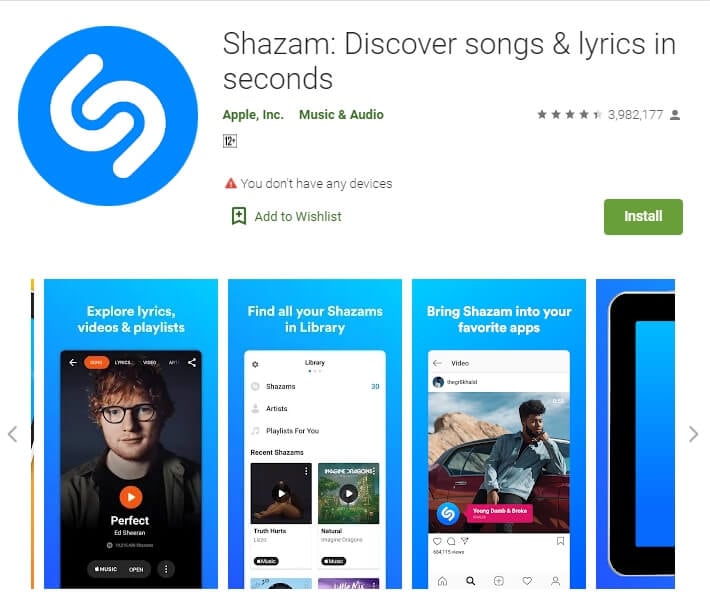
You can listen to the song on this song identifier app or add the song to your Spotify or Apple Music, or Google Play Music playlist. Shazam also allows you to watch music videos from YouTube and Apple Music.
The Pop-Up feature of Shazam is one of its best features. It enables you to identify music on any app like YouTube, Instagram, Facebook, and TikTok. Besides, you can use the app offline and in the background to continue identifying songs even though the app is not in use.
The app will also notify you about your country’s and city’s current music scene, recommend playlists according to your tastes and lets you share songs on social media. The Shazam app has been downloaded over 200 million times in 150+ countries. This should convince you of the app’s credibility.
In 2018, Apple Inc. completed acquiring Shazam for $400 million dollars. Since, then Shazam comes integrated with iOS (version 14.2 and higher).
3. BeatFind Music Recognition
The Beatfind Music recognition app for Android is one of the best song identifier apps out there. It is straightforward to use; just switch on the app’s listen mode and let it process the yet unidentified music or song playing around you, and the app will identify it almost instantly. As many as 8 million people worldwide has downloaded this app.
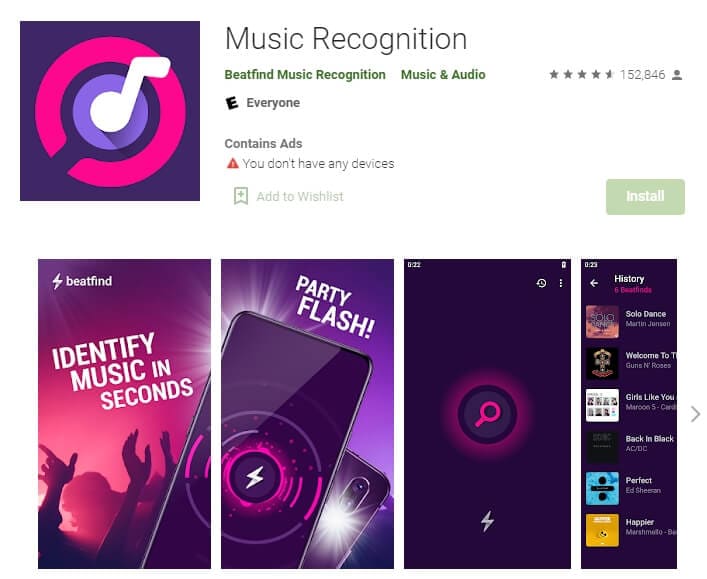
You can gather information about the song, the artist and be notified about the top tracks recorded by him/her. Beatfind will allow you to play a preview of the song on the app so that you can be sure that this is the song you are looking for and then you will have the option to listen to the full track on Deezer or Spotify or YouTube. It records your searches so that it is easier for you to find a song later.
The unique feature of this song finder app is that it can turn any room into a discotheque. It has a flashlight party mode that emanates strobes of light in sync with the music being played. You can also share identified songs with your friends and family via social media.
4. SoundHound
SoundHound is simple to use and has a host of features that give you a complete music experience. It has over 300 million users. Switch on the app’s listening mode and discover any song or music playing around you. You can also identify a song or a tune stuck in your mind by just humming it to the listening mode and SoundHound will do the rest.
All your song searches are stored so that you can replay them later without having to search for them all over again. The app has real-time lyrics that let you sing along your favorite song. Consequently, you can also search for lyrics of a particular song by using type search and voice search features of the app (which works like Google Assistant). You can use this voice search to conduct all types of searches on this song finder app.
You can transfer all your discovered songs to your Spotify playlist, provided you have accounts in both Spotify and SoundHound. Or you can play the discovered songs on SoundHound itself. You can also stream your Spotify playlist on SoundHound.
Apart from the above, you can get all related information on your discovered songs and share those songs with your friends and family via social media.
5. Genius – Song Lyrics & More
Genius is more of a lyrics finder app than a song identifier app for Android. Its database contains lyrics of more than 1.7 million songs, and that database is entirely crowdsourced. Besides lyrics, you will get authentic information regarding the backstory of the songs on the database.
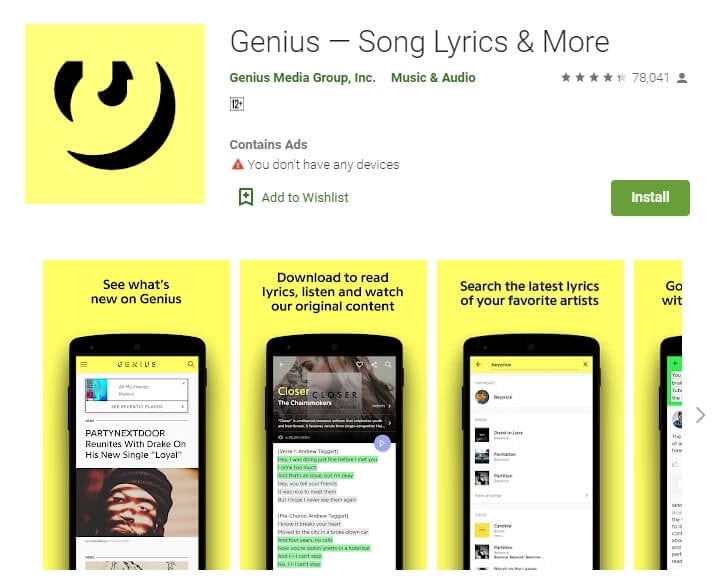
It is very simple to use the app. Just open the app, press the soundwave button and hold the phone near the source of the music. You will get lyrics and other information on that song in a matter of seconds.
Genius is run by the inputs of dedicated and obsessed music fans. So, if you fall into that category and want more to do with a song than just listening to it, then this is a must-have app for you.
6. MusiXmatch - Lyrics for your music
The MusiXmatch is an app dedicated to bringing you the lyrics to any song you are listening at the moment. It has a handy floating lyrics widget feature that enables you get real-time lyrics on the track you are playing. The app has been downloaded more than 50 million times.
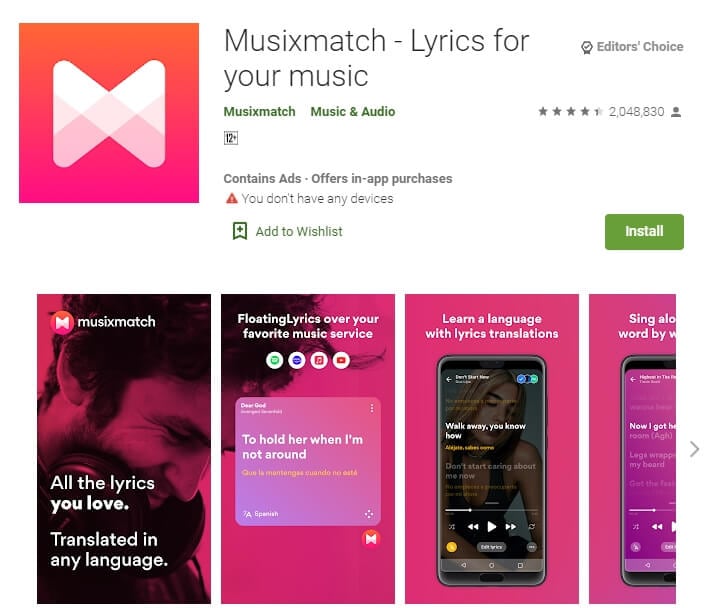
What is best is that, the track can be playing on any music streaming app, and the floating widget of MusiXmatch will display the lyrics in sync with the song being played. Lyrics will appear embedded in YouTube music videos, whether they be in portrait or landscape mode.
It can also translate lyrics in real-time, thus enabling you to learn a new language while doing one of your favorite tasks listening to music. You can get the lyrics and translation of any song playing around you with a single tap. You can also find your favorite song by simply typing a single line of lyrics of that song.
The app also contains allied information on the identified songs. You can be a part of this app’s community and feed this database with music knowledge and information, lyrics and translations.
You can stream MusiXmatch on television via Chromecast, and the app is available on all Android wearable devices. A premium version of this app allows you to view lyrics offline, removes advertisements from the app, and enables a party mode where themes play in sync with the song lyrics.
Conclusion
The world of music is vast and dynamic. There are hundreds of music genres, thousands of songs in each genre and billions of recorded songs if we take into account songs from every country and language in this world.
Finding your favorite songs in this musical universe is nothing short of a treasure hunt, especially if you know very little of your coveted song( like just a tune, a jingle, a single line of lyrics, or you just heard the song for the first time).
To assist you in this hunt are the above song finder apps and lyric finders. Use them, and no song will be beyond your reach.

Benjamin Arango
Benjamin Arango is a writer and a lover of all things video.
Follow @Benjamin Arango
Benjamin Arango
Mar 27, 2024• Proven solutions
There must have been instances in your life when you heard a song on the go, and it took you down memory lane, with you remembering those long-gone times when you used to listen to that song regularly.
You tried searching for that song in your phone’s music app so that you might savor some sweet nostalgia, but alas, you realize that you no longer remember the song’s name or any definitive lyrics or the artist’s name.
Does that mean you forego that song until you remember the details? Absolutely not. There are many song finder apps that you can install on your android phone, which will help you find that song. You just need to hum whatever tune you remember of that song into the built-in-mic, and the app would do the rest.
Best Free Song Finder Apps for Android in 2021
Some song identifier apps for Android can be downloaded and used for free. Following are 6 of the best such apps.
1. Google App
On 15th October 2020, Google introduced the hum to search feature to the Google app and widget. Google hum to search is like any other hum to search music app and is very easy to use. Apple users can avail of this feature in English, while Android users can search songs in excess of 20 languages. Almost 4 billion people worldwide use Google, making it the most popular app of all time.
Using your hummed input, the Google hum to search algorithm identifies probable songs that sound closer to the tune and presents you with the results. Then you choose the appropriate match from among it. The results also include information on the artist and the song, related music videos, covers, lyrics and song analysis.
This is how you use the Google app for song recognition:
Step 1- Open the Google app or Google search widget on your phone and tap the mic button.
Step 2- Either click on the “Search a song” button or say “what’s this song?” before humming the tune for 10 to 15 seconds. That’s it. That’s all you need to do, and the Google hum to search feature will do the rest.
It is as easy to identify a song using Google Assistant. Say, “Hey Google, what’s this song?” before humming the tune, and that’s about what is required by the algorithm to pull out probable songs from the database.
And don’t worry about the quality of your humming. It need not be pitch perfect, just distinct and clear enough.
2. Shazam
Shazam music recognition app can identify your tune and song in seconds. You will get to find and listen to your desired song and get all related information like lyrics, videos, and artist’s profile.

You can listen to the song on this song identifier app or add the song to your Spotify or Apple Music, or Google Play Music playlist. Shazam also allows you to watch music videos from YouTube and Apple Music.
The Pop-Up feature of Shazam is one of its best features. It enables you to identify music on any app like YouTube, Instagram, Facebook, and TikTok. Besides, you can use the app offline and in the background to continue identifying songs even though the app is not in use.
The app will also notify you about your country’s and city’s current music scene, recommend playlists according to your tastes and lets you share songs on social media. The Shazam app has been downloaded over 200 million times in 150+ countries. This should convince you of the app’s credibility.
In 2018, Apple Inc. completed acquiring Shazam for $400 million dollars. Since, then Shazam comes integrated with iOS (version 14.2 and higher).
3. BeatFind Music Recognition
The Beatfind Music recognition app for Android is one of the best song identifier apps out there. It is straightforward to use; just switch on the app’s listen mode and let it process the yet unidentified music or song playing around you, and the app will identify it almost instantly. As many as 8 million people worldwide has downloaded this app.

You can gather information about the song, the artist and be notified about the top tracks recorded by him/her. Beatfind will allow you to play a preview of the song on the app so that you can be sure that this is the song you are looking for and then you will have the option to listen to the full track on Deezer or Spotify or YouTube. It records your searches so that it is easier for you to find a song later.
The unique feature of this song finder app is that it can turn any room into a discotheque. It has a flashlight party mode that emanates strobes of light in sync with the music being played. You can also share identified songs with your friends and family via social media.
4. SoundHound
SoundHound is simple to use and has a host of features that give you a complete music experience. It has over 300 million users. Switch on the app’s listening mode and discover any song or music playing around you. You can also identify a song or a tune stuck in your mind by just humming it to the listening mode and SoundHound will do the rest.
All your song searches are stored so that you can replay them later without having to search for them all over again. The app has real-time lyrics that let you sing along your favorite song. Consequently, you can also search for lyrics of a particular song by using type search and voice search features of the app (which works like Google Assistant). You can use this voice search to conduct all types of searches on this song finder app.
You can transfer all your discovered songs to your Spotify playlist, provided you have accounts in both Spotify and SoundHound. Or you can play the discovered songs on SoundHound itself. You can also stream your Spotify playlist on SoundHound.
Apart from the above, you can get all related information on your discovered songs and share those songs with your friends and family via social media.
5. Genius – Song Lyrics & More
Genius is more of a lyrics finder app than a song identifier app for Android. Its database contains lyrics of more than 1.7 million songs, and that database is entirely crowdsourced. Besides lyrics, you will get authentic information regarding the backstory of the songs on the database.

It is very simple to use the app. Just open the app, press the soundwave button and hold the phone near the source of the music. You will get lyrics and other information on that song in a matter of seconds.
Genius is run by the inputs of dedicated and obsessed music fans. So, if you fall into that category and want more to do with a song than just listening to it, then this is a must-have app for you.
6. MusiXmatch - Lyrics for your music
The MusiXmatch is an app dedicated to bringing you the lyrics to any song you are listening at the moment. It has a handy floating lyrics widget feature that enables you get real-time lyrics on the track you are playing. The app has been downloaded more than 50 million times.

What is best is that, the track can be playing on any music streaming app, and the floating widget of MusiXmatch will display the lyrics in sync with the song being played. Lyrics will appear embedded in YouTube music videos, whether they be in portrait or landscape mode.
It can also translate lyrics in real-time, thus enabling you to learn a new language while doing one of your favorite tasks listening to music. You can get the lyrics and translation of any song playing around you with a single tap. You can also find your favorite song by simply typing a single line of lyrics of that song.
The app also contains allied information on the identified songs. You can be a part of this app’s community and feed this database with music knowledge and information, lyrics and translations.
You can stream MusiXmatch on television via Chromecast, and the app is available on all Android wearable devices. A premium version of this app allows you to view lyrics offline, removes advertisements from the app, and enables a party mode where themes play in sync with the song lyrics.
Conclusion
The world of music is vast and dynamic. There are hundreds of music genres, thousands of songs in each genre and billions of recorded songs if we take into account songs from every country and language in this world.
Finding your favorite songs in this musical universe is nothing short of a treasure hunt, especially if you know very little of your coveted song( like just a tune, a jingle, a single line of lyrics, or you just heard the song for the first time).
To assist you in this hunt are the above song finder apps and lyric finders. Use them, and no song will be beyond your reach.

Benjamin Arango
Benjamin Arango is a writer and a lover of all things video.
Follow @Benjamin Arango
Benjamin Arango
Mar 27, 2024• Proven solutions
There must have been instances in your life when you heard a song on the go, and it took you down memory lane, with you remembering those long-gone times when you used to listen to that song regularly.
You tried searching for that song in your phone’s music app so that you might savor some sweet nostalgia, but alas, you realize that you no longer remember the song’s name or any definitive lyrics or the artist’s name.
Does that mean you forego that song until you remember the details? Absolutely not. There are many song finder apps that you can install on your android phone, which will help you find that song. You just need to hum whatever tune you remember of that song into the built-in-mic, and the app would do the rest.
Best Free Song Finder Apps for Android in 2021
Some song identifier apps for Android can be downloaded and used for free. Following are 6 of the best such apps.
1. Google App
On 15th October 2020, Google introduced the hum to search feature to the Google app and widget. Google hum to search is like any other hum to search music app and is very easy to use. Apple users can avail of this feature in English, while Android users can search songs in excess of 20 languages. Almost 4 billion people worldwide use Google, making it the most popular app of all time.
Using your hummed input, the Google hum to search algorithm identifies probable songs that sound closer to the tune and presents you with the results. Then you choose the appropriate match from among it. The results also include information on the artist and the song, related music videos, covers, lyrics and song analysis.
This is how you use the Google app for song recognition:
Step 1- Open the Google app or Google search widget on your phone and tap the mic button.
Step 2- Either click on the “Search a song” button or say “what’s this song?” before humming the tune for 10 to 15 seconds. That’s it. That’s all you need to do, and the Google hum to search feature will do the rest.
It is as easy to identify a song using Google Assistant. Say, “Hey Google, what’s this song?” before humming the tune, and that’s about what is required by the algorithm to pull out probable songs from the database.
And don’t worry about the quality of your humming. It need not be pitch perfect, just distinct and clear enough.
2. Shazam
Shazam music recognition app can identify your tune and song in seconds. You will get to find and listen to your desired song and get all related information like lyrics, videos, and artist’s profile.

You can listen to the song on this song identifier app or add the song to your Spotify or Apple Music, or Google Play Music playlist. Shazam also allows you to watch music videos from YouTube and Apple Music.
The Pop-Up feature of Shazam is one of its best features. It enables you to identify music on any app like YouTube, Instagram, Facebook, and TikTok. Besides, you can use the app offline and in the background to continue identifying songs even though the app is not in use.
The app will also notify you about your country’s and city’s current music scene, recommend playlists according to your tastes and lets you share songs on social media. The Shazam app has been downloaded over 200 million times in 150+ countries. This should convince you of the app’s credibility.
In 2018, Apple Inc. completed acquiring Shazam for $400 million dollars. Since, then Shazam comes integrated with iOS (version 14.2 and higher).
3. BeatFind Music Recognition
The Beatfind Music recognition app for Android is one of the best song identifier apps out there. It is straightforward to use; just switch on the app’s listen mode and let it process the yet unidentified music or song playing around you, and the app will identify it almost instantly. As many as 8 million people worldwide has downloaded this app.

You can gather information about the song, the artist and be notified about the top tracks recorded by him/her. Beatfind will allow you to play a preview of the song on the app so that you can be sure that this is the song you are looking for and then you will have the option to listen to the full track on Deezer or Spotify or YouTube. It records your searches so that it is easier for you to find a song later.
The unique feature of this song finder app is that it can turn any room into a discotheque. It has a flashlight party mode that emanates strobes of light in sync with the music being played. You can also share identified songs with your friends and family via social media.
4. SoundHound
SoundHound is simple to use and has a host of features that give you a complete music experience. It has over 300 million users. Switch on the app’s listening mode and discover any song or music playing around you. You can also identify a song or a tune stuck in your mind by just humming it to the listening mode and SoundHound will do the rest.
All your song searches are stored so that you can replay them later without having to search for them all over again. The app has real-time lyrics that let you sing along your favorite song. Consequently, you can also search for lyrics of a particular song by using type search and voice search features of the app (which works like Google Assistant). You can use this voice search to conduct all types of searches on this song finder app.
You can transfer all your discovered songs to your Spotify playlist, provided you have accounts in both Spotify and SoundHound. Or you can play the discovered songs on SoundHound itself. You can also stream your Spotify playlist on SoundHound.
Apart from the above, you can get all related information on your discovered songs and share those songs with your friends and family via social media.
5. Genius – Song Lyrics & More
Genius is more of a lyrics finder app than a song identifier app for Android. Its database contains lyrics of more than 1.7 million songs, and that database is entirely crowdsourced. Besides lyrics, you will get authentic information regarding the backstory of the songs on the database.

It is very simple to use the app. Just open the app, press the soundwave button and hold the phone near the source of the music. You will get lyrics and other information on that song in a matter of seconds.
Genius is run by the inputs of dedicated and obsessed music fans. So, if you fall into that category and want more to do with a song than just listening to it, then this is a must-have app for you.
6. MusiXmatch - Lyrics for your music
The MusiXmatch is an app dedicated to bringing you the lyrics to any song you are listening at the moment. It has a handy floating lyrics widget feature that enables you get real-time lyrics on the track you are playing. The app has been downloaded more than 50 million times.

What is best is that, the track can be playing on any music streaming app, and the floating widget of MusiXmatch will display the lyrics in sync with the song being played. Lyrics will appear embedded in YouTube music videos, whether they be in portrait or landscape mode.
It can also translate lyrics in real-time, thus enabling you to learn a new language while doing one of your favorite tasks listening to music. You can get the lyrics and translation of any song playing around you with a single tap. You can also find your favorite song by simply typing a single line of lyrics of that song.
The app also contains allied information on the identified songs. You can be a part of this app’s community and feed this database with music knowledge and information, lyrics and translations.
You can stream MusiXmatch on television via Chromecast, and the app is available on all Android wearable devices. A premium version of this app allows you to view lyrics offline, removes advertisements from the app, and enables a party mode where themes play in sync with the song lyrics.
Conclusion
The world of music is vast and dynamic. There are hundreds of music genres, thousands of songs in each genre and billions of recorded songs if we take into account songs from every country and language in this world.
Finding your favorite songs in this musical universe is nothing short of a treasure hunt, especially if you know very little of your coveted song( like just a tune, a jingle, a single line of lyrics, or you just heard the song for the first time).
To assist you in this hunt are the above song finder apps and lyric finders. Use them, and no song will be beyond your reach.

Benjamin Arango
Benjamin Arango is a writer and a lover of all things video.
Follow @Benjamin Arango
Benjamin Arango
Mar 27, 2024• Proven solutions
There must have been instances in your life when you heard a song on the go, and it took you down memory lane, with you remembering those long-gone times when you used to listen to that song regularly.
You tried searching for that song in your phone’s music app so that you might savor some sweet nostalgia, but alas, you realize that you no longer remember the song’s name or any definitive lyrics or the artist’s name.
Does that mean you forego that song until you remember the details? Absolutely not. There are many song finder apps that you can install on your android phone, which will help you find that song. You just need to hum whatever tune you remember of that song into the built-in-mic, and the app would do the rest.
Best Free Song Finder Apps for Android in 2021
Some song identifier apps for Android can be downloaded and used for free. Following are 6 of the best such apps.
1. Google App
On 15th October 2020, Google introduced the hum to search feature to the Google app and widget. Google hum to search is like any other hum to search music app and is very easy to use. Apple users can avail of this feature in English, while Android users can search songs in excess of 20 languages. Almost 4 billion people worldwide use Google, making it the most popular app of all time.
Using your hummed input, the Google hum to search algorithm identifies probable songs that sound closer to the tune and presents you with the results. Then you choose the appropriate match from among it. The results also include information on the artist and the song, related music videos, covers, lyrics and song analysis.
This is how you use the Google app for song recognition:
Step 1- Open the Google app or Google search widget on your phone and tap the mic button.
Step 2- Either click on the “Search a song” button or say “what’s this song?” before humming the tune for 10 to 15 seconds. That’s it. That’s all you need to do, and the Google hum to search feature will do the rest.
It is as easy to identify a song using Google Assistant. Say, “Hey Google, what’s this song?” before humming the tune, and that’s about what is required by the algorithm to pull out probable songs from the database.
And don’t worry about the quality of your humming. It need not be pitch perfect, just distinct and clear enough.
2. Shazam
Shazam music recognition app can identify your tune and song in seconds. You will get to find and listen to your desired song and get all related information like lyrics, videos, and artist’s profile.

You can listen to the song on this song identifier app or add the song to your Spotify or Apple Music, or Google Play Music playlist. Shazam also allows you to watch music videos from YouTube and Apple Music.
The Pop-Up feature of Shazam is one of its best features. It enables you to identify music on any app like YouTube, Instagram, Facebook, and TikTok. Besides, you can use the app offline and in the background to continue identifying songs even though the app is not in use.
The app will also notify you about your country’s and city’s current music scene, recommend playlists according to your tastes and lets you share songs on social media. The Shazam app has been downloaded over 200 million times in 150+ countries. This should convince you of the app’s credibility.
In 2018, Apple Inc. completed acquiring Shazam for $400 million dollars. Since, then Shazam comes integrated with iOS (version 14.2 and higher).
3. BeatFind Music Recognition
The Beatfind Music recognition app for Android is one of the best song identifier apps out there. It is straightforward to use; just switch on the app’s listen mode and let it process the yet unidentified music or song playing around you, and the app will identify it almost instantly. As many as 8 million people worldwide has downloaded this app.

You can gather information about the song, the artist and be notified about the top tracks recorded by him/her. Beatfind will allow you to play a preview of the song on the app so that you can be sure that this is the song you are looking for and then you will have the option to listen to the full track on Deezer or Spotify or YouTube. It records your searches so that it is easier for you to find a song later.
The unique feature of this song finder app is that it can turn any room into a discotheque. It has a flashlight party mode that emanates strobes of light in sync with the music being played. You can also share identified songs with your friends and family via social media.
4. SoundHound
SoundHound is simple to use and has a host of features that give you a complete music experience. It has over 300 million users. Switch on the app’s listening mode and discover any song or music playing around you. You can also identify a song or a tune stuck in your mind by just humming it to the listening mode and SoundHound will do the rest.
All your song searches are stored so that you can replay them later without having to search for them all over again. The app has real-time lyrics that let you sing along your favorite song. Consequently, you can also search for lyrics of a particular song by using type search and voice search features of the app (which works like Google Assistant). You can use this voice search to conduct all types of searches on this song finder app.
You can transfer all your discovered songs to your Spotify playlist, provided you have accounts in both Spotify and SoundHound. Or you can play the discovered songs on SoundHound itself. You can also stream your Spotify playlist on SoundHound.
Apart from the above, you can get all related information on your discovered songs and share those songs with your friends and family via social media.
5. Genius – Song Lyrics & More
Genius is more of a lyrics finder app than a song identifier app for Android. Its database contains lyrics of more than 1.7 million songs, and that database is entirely crowdsourced. Besides lyrics, you will get authentic information regarding the backstory of the songs on the database.

It is very simple to use the app. Just open the app, press the soundwave button and hold the phone near the source of the music. You will get lyrics and other information on that song in a matter of seconds.
Genius is run by the inputs of dedicated and obsessed music fans. So, if you fall into that category and want more to do with a song than just listening to it, then this is a must-have app for you.
6. MusiXmatch - Lyrics for your music
The MusiXmatch is an app dedicated to bringing you the lyrics to any song you are listening at the moment. It has a handy floating lyrics widget feature that enables you get real-time lyrics on the track you are playing. The app has been downloaded more than 50 million times.

What is best is that, the track can be playing on any music streaming app, and the floating widget of MusiXmatch will display the lyrics in sync with the song being played. Lyrics will appear embedded in YouTube music videos, whether they be in portrait or landscape mode.
It can also translate lyrics in real-time, thus enabling you to learn a new language while doing one of your favorite tasks listening to music. You can get the lyrics and translation of any song playing around you with a single tap. You can also find your favorite song by simply typing a single line of lyrics of that song.
The app also contains allied information on the identified songs. You can be a part of this app’s community and feed this database with music knowledge and information, lyrics and translations.
You can stream MusiXmatch on television via Chromecast, and the app is available on all Android wearable devices. A premium version of this app allows you to view lyrics offline, removes advertisements from the app, and enables a party mode where themes play in sync with the song lyrics.
Conclusion
The world of music is vast and dynamic. There are hundreds of music genres, thousands of songs in each genre and billions of recorded songs if we take into account songs from every country and language in this world.
Finding your favorite songs in this musical universe is nothing short of a treasure hunt, especially if you know very little of your coveted song( like just a tune, a jingle, a single line of lyrics, or you just heard the song for the first time).
To assist you in this hunt are the above song finder apps and lyric finders. Use them, and no song will be beyond your reach.

Benjamin Arango
Benjamin Arango is a writer and a lover of all things video.
Follow @Benjamin Arango
The Ultimate Guide to Best Podcast Platforms
10 Best Podcast Hosting Platforms

Benjamin Arango
Mar 27, 2024• Proven solutions
Covering interesting topics in your podcasts or using professional audio recording and editing tools to process them, won’t mean much if you cannot reach your audience. Uploading a large numbers of audio files to your own website is not always an option, since the storage space, you have at your disposal may be too small to store all of your podcasts.
That is where podcast hosting platforms like Buzzsprout or Podbean come in, to help podcasters store their content safely and deliver their latest podcast to different apps and directories through the RSS feed.
With so many options out there, finding a podcast hosting platform can be a daunting task for podcasters who are just starting out. So, in this article, we are going to take you through the ten best podcast hosting platforms and provide you with answers to some of the most commonly asked questions about podcast hosting services.
- Part 1: Top Ten Podcast Hosting Platforms
- Part 2: Most Frequently Asked Questions about Podcast Hosting Platforms
Comparison of the Best Podcast Hosting Platforms
Are you too busy to go through all of the podcast hosting platforms we featured in this article? Do not worry, here’s a quick comparison of the best podcast hosting platforms.
| Hosting Platform | Subscription Cost | Storage | Bandwidth | Podcast Analytics | RSS Support | Website host |
|---|---|---|---|---|---|---|
| Buzzsprout | Ranges from free to $24 | Unlimited | 250 GB | Yes | Yes | Yes |
| Blubrry | Ranges from $12 to $80 per month | 100 MB | Unlimited | Yes | Yes | Yes |
| Castos | Ranges from $19 to $49 per month | Unlimited | Unlimited | Yes | Yes | Yes |
| Podbean | Ranges from free to $99 per month | Unlimited | Unlimited | Yes | Yes | Yes |
| Podiant | Ranges from $12,99 to 35,97 per month | Unlimited | Unlimited | Yes | Yes | Yes |
| Transistor.fm | Ranges from $19,00 to $99 per month | Unlimited | Unlimited | Yes | Yes | Yes |
| Simplecast | Ranges from $15 to $85 per month | Unlimited | 20,000 downloads | Yes | Yes | Yes |
| Speaker | Ranges from free to $50 per month | Varies from 5 to 1500 hours | Unlimited | Yes | Yes | No |
| Libsyn | Ranges from $5 to $150 per month | Varies between 50 MB and 80 MB | Unlimited | Yes | Yes | Yes |
| PODOMATIC | Ranges from free to $20, 82 per month | Limited, depends on the subscription model | Limited, depends on the subscription model | Yes | Yes | Yes |
Part 1: Top Ten Podcast Hosting Platforms
Building an audience for your podcast can take months, sometimes even years, and for that reason having access to a reliable hosting platform that lets you distribute new episodes of your podcast effortlessly is vital for their success. Factors that range from subscription fees to RSS support can influence your choice of a podcast hosting platform, so let’s take a look at what some of the best hosting platforms for podcasters have to offer.
1. Buzzsprout
Price: Free, pricing options start at $12 per month
The fact that over 100,000 podcasters used Buzzsprout’s services to launch their podcasts, shows how highly esteemed the platform is within the podcasting community. The episode automation feature enables you to just upload an audio file and it takes care of the ID3 tags and bitrates for you. Buzzsprout grants you access to a huge audience by allowing your subscribers to listen to your podcast from Spotify, Apple and Google Podcasts, Alexa or Overcast. The platform also provides you with advanced statistics for each episode of your podcast you upload. So, you can easily find out which apps they are using to listen to your podcasts or to learn the location at which your podcast was played.
Pros
- Unlimited storage space
- 90-day trial period
- Grants users access to most popular podcast directories
- Offers monetization options through affiliate marketing
Cons
- Bandwidth is limited to 250 GB
- The free version of Buzzsprout places ads to your podcasts on public sites
2. Blubrry
Price: Pricing options start at $12 per month
Uploading a new podcast and publishing it through Blubrry is a simple three-step process that can be completed in just a few minutes. This hosting platform grants you complete control over the iTunes’ RSS feed and it is optimized for the use on Android devices. In case you are considering moving from another platform like Libsyn or SoundCloud, you can easily migrate all of your content to Blubrry. Even though this podcast hosting platform features analytics tools you must purchase the Podcast Statistics package if you want to have a clear overview of the statistics your podcasts are generating.
Pros
- The effortless podcast publishing process
- Offers WordPress plugins
- Free and easy media migration
- Unlimited bandwidth
Cons
- Storage space depends on the subscription plan
- Access to analytics tools is not free
3. Castos
Price: Pricing options start at $19 per month
If you are searching for a platform that places no limits on your storage space or the bandwidth then you shouldn’t look much further than Castos. The platform lets you create as many new shows as you want and allows you to upload an unlimited number of episodes to each show you create. Podcasts you upload to Castos are automatically shared to all of the most popular podcast directories, including Sticher, iTunes, Spotify or Google Play. You can also transcribe all of your podcasts with a click of a button, but you must pay a small fee for each minute of the podcast you transcribe.
Pros
- Fully customizable podcast player
- Offers support for both audio and video podcasts
- Advanced analytics tools
- Grants podcasters access to all of the most popular podcast directories
Cons
- Short free trial period
- Video republishing to YouTube is only available within the Growth subscription model
4. Podbean
Price: Free, pricing options start at $9 per month
Podcasters who would like to have their own full-featured podcast website and gain access to a website builder can hardly go wrong if they opt for Podbean. Moreover, you’ll be able to use your own domain and your branding if you create an account on this hosting platform. Podbean offers a broad selection of podcast templates and lets you choose the layout. Furthermore, Podbean provides excellent monetization opportunities, either through advertising, crowdfunding or premium content. The free version of the podcast hosting platform offers only limited broadband and storage space, while video support is only available if you purchase Unlimited Plus or Business pricing plans.
Pros
- Compatible with iPhone and Android apps and embeddable media players
- Provides RSS and iTunes support
- Offers a broad selection of podcast themes
- Allows podcasters to create their own podcast sites
Cons
- You must upgrade from the free version in order to have unlimited storage and bandwidth
- Running multiple podcast channels is only possible if you have the Business pricing plan
5. Podiant
Price: Pricing plans start at $12,99
Podiant grants you access to all the tools you are going to need to upload and publish a new episode of your podcast. In fact, 22,200 podcast episodes are published through Poidant each day that are delivered to hundreds of thousands of listeners around the globe. The platform lets you choose from a broad range of themes, but it also features a templating engine that allows you to change the code on your podcasting site. Moreover, you can use Poidant to create a blog, embed content from Twitter, Instagram or YouTube in order to extend the reach of your podcasts and broaden their audience.
Pros
- Allows users to host all their shows on one website
- No bandwidth and storage space limitations
- Compatible with all major podcasting directories and apps
- Supports integrations through Zapier
Cons
- The quality of the analytics data depends on the subscription plan
- The free trial period lasts only two weeks
6. Transistor
Price: Pricing plans start at $19,00 per month
Professional podcasters and creatives from every corner of the world are already using Transistor to publish their podcasts. This podcast hosting platform makes all episodes of your podcasts available on Spotify, Overcast, and other popular podcast directories. Moreover, you can create unlimited podcasts and upload as many episodes as you want to the website you created with Transistor. The platform produces analytics reports for each of your podcasts, regardless of the pricing plan you own, but the number of collaborators on a single Transistor account depends on the subscription model. The number of monthly podcast downloads is limited and it varies from one pricing plan to another.
Pros
- Allows users to create private podcast feeds
- Supports integrations with email marketing platforms like Drip or MailChimp
- Embeddable podcast player
- The functionally organized RSS feed
Cons
- You must purchase the Business subscription model to remove the Transistor’s branding
- If you would like to create more than three private podcasts, you must contact the customer support
7. Simplecast
Price: Pricing options start at $15
The distribution, analytics, and sharing tools this podcast hosting platform provides are powerful enough to cater even for the most demanding podcasting needs. Simplecast lets you choose from a variety of themes that are optimized for mobile devices and search engines. It also enables you to customize the colors of each theme with its website builder. All podcasts you upload to Simplecast can be shared on all of the podcast directories that attract millions of listeners. What’s more, the platform makes monitoring the statistics your podcasts generate easy, so that you can discover new ways to reach new audiences.
Pros
- Websites built with Simplecast are secure
- Great selection of web-players
- Provides detailed statistics for all podcasts
- Doesn’t restrict the bandwidth or storage space
Cons
- The size of the team using Simplecast can’t exceed eight members
- Building more than three pages with Simplecast isn’t an option
8. Spreaker
Price: Free, pricing options start at $7 per month
Spreaker is an affordable podcast hosting platform for all podcasters who are just starting out or looking for a new platform they can use to host their shows. In addition, you can also stream your podcasts live, although their maximum duration depends on the subscription plan you have. The storage space you are going to have at your disposal also varies from one pricing plan to another, but even the free version of Spreaker lets you store up to five hours of audio on the cloud. However, there are no limits to the number of listeners which enables you to grow your audience continually.
Pros
- An inexpensive option for both novice and seasoned podcasters
- A fully customizable RSS feed
- Supports content migrations through RSS feed
- Provides excellent monetization options
Cons
- The storage space is limited
- You must purchase the Broadcaster subscription model in order to gain access to the platform’s analytics tools.
9. Libsyn
Price: Pricing options start at $5
This platform integrates with more than twenty podcast apps, social media platforms, and WordPress websites via the OnPublish feature. Libsyin features powerful scheduling tools, which enables you to choose the exact date and time when the next episode of your podcast is going to be published. The RSS is compliant with Apple Podcasts, which makes it easier to add a title, choose a category or write podcast summaries for each new episode you would like to optimize for playback on Apple devices. Libsyn offers Double Opt-in Advertising and MyLibSyn Premium Paywall monetization options so that you can choose the method of earning money through this podcast hosting platform that is the most convenient for you.
Pros
- Supports audio, video, text and PDF hosting
- Excellent podcast distribution capabilities
- Cheaper than most of its competitors
- Creating a publishing schedule for your podcasts is easy
Cons
- Very limited storage space, regardless of the pricing plan you purchase
- Underwhelming statistics tracking options
10. Podomatic
Price: Free, pricing options start at $8,32
The options you will have at your disposal if you opt to publish your podcasts with Podomatic, largely depends on the subscription model you have. Even though anyone can use this podcast platform for free, the bandwidth and storage space that are available on the free version of Podomatic can limit your options. Besides, publishing podcasts, you can also use the platform to listen to podcasts, from browsers or iPhone and Android devices. Podomatic lets you monetize your podcasts by connecting your Patreon account to your podcast website or by adding Podomatic Podcast to Advertise Cast.
Pros:
- Podomatic app is available for both iOS and Android devices
- Podcast published through Podomatic can be played directly from Twitter and Facebook feeds
- Equipped with a powerful drag-and-drop website builder
- Offers a variety of themes designed exclusively for podcasts
Cons
- Unlimited storage space and bandwidth are only available in the Enterprise subscription model
- Offers only basic podcast statistics
Part 2: The Most Frequently Asked Questions about Podcast Hosting Platforms
In order to add episodes of your podcasts to podcast directories, you must meet only three requirements. Your audio file must be saved in the MP3 format, you must have access to the podcast hosting platform, and you must be able to add a podcast to an RSS feed. The hosting platform you selected will utilize its RSS feed to distribute your podcasts to the apps and services your audience is using to listen to them and deliver a new episode of your show to your listeners as soon as you publish it. The reach of your podcasts, your monetization capabilities or whether or not you will be able to create custom domains depends on the podcast hosting platform you choose.
What is podcast hosting and what are its main benefits?
All podcast hosting platforms let their users store their podcasts online and create an RSS feed for them that is used to add podcast to different podcast directories. Besides sending each new episode of your podcast to your subscribers, podcast hosting platforms also enable you to track their performance and learn which apps were used to access them as well as a plethora of other relevant metrics. Some podcast hosting platforms feature website builders that allow you to create custom domain landing pages, blogs or add widgets.
Why do I need podcast hosting services?
Podcast hosting services simplify the process of storing and publishing podcasts and ensure that each new episode you publish reaches your subscribers. In addition, most platforms offer a quick and easy way to add tags, cover art or podcast descriptions, so that you can provide all the information your listeners need to find your podcasts effortlessly.
How to select the right podcast hosting platform?
The reason why you are creating a podcast can often help you figure out which podcast hosting platform is the best option for you. If you would like to periodically share short interviews or simply have fun with your friends, then choosing a free version of a podcast hosting platform is your best option.
However, if you take podcasting seriously, finding out how much storage space a platform offers or the maximum bandwidth can help you decide if the platform you are considering is the right choice for you. Moreover, podcasters who also create video podcasts should check if the platform they would like to use to distribute their podcasts supports hosting and publishing video files. Ultimately, the amount of money you are willing to spend on subscription will determine which podcast hosting platform to pick since there is no reason to spend vast amounts of money on features you have no intention of using.
Is podcast hosting free?
Even though most podcast hosting platforms either have free versions or free trial, podcast hosting over an extended period of time is never free. Each platform offers different pricing options and lets you choose the one that is best suited for your needs. If you decide to publish your podcasts with a free version of the podcast hosting platform, you should keep in mind that the scope of your options is going to be limited.
What is the average cost of podcast hosting services?
The cost of a monthly subscription for a podcast hosting service can be anywhere between $7 and $99. The majority of basic and pro pricing plans can be purchased for less than $20, but if you would like to utilize all the features a podcast hosting platform has to offer, then your monthly subscription can cost much more than a hundred dollars. Lower priced options often lack advanced file-sharing tools or don’t provide integrations features, which is the reason why you should only consider them if you just need a quick way to publish a podcast.
Conclusion
Each step of the process of creating a podcast is equally important, and the quality of the microphone you’re using to record an episode of your podcast is of no less significance than the hosting platform you’re using to publish a podcast. Each podcast hosting platform we included in this article ensures that your podcasts are delivered to all of your subscribers, but which one you are going to choose depends on a plethora of factors that range from a platform’s storage capacity to the number of podcast directories to which your podcasts are added. Which podcast hosting platform are you using to publish your podcasts? Leave a comment and let us know.

Benjamin Arango
Benjamin Arango is a writer and a lover of all things video.
Follow @Benjamin Arango
Benjamin Arango
Mar 27, 2024• Proven solutions
Covering interesting topics in your podcasts or using professional audio recording and editing tools to process them, won’t mean much if you cannot reach your audience. Uploading a large numbers of audio files to your own website is not always an option, since the storage space, you have at your disposal may be too small to store all of your podcasts.
That is where podcast hosting platforms like Buzzsprout or Podbean come in, to help podcasters store their content safely and deliver their latest podcast to different apps and directories through the RSS feed.
With so many options out there, finding a podcast hosting platform can be a daunting task for podcasters who are just starting out. So, in this article, we are going to take you through the ten best podcast hosting platforms and provide you with answers to some of the most commonly asked questions about podcast hosting services.
- Part 1: Top Ten Podcast Hosting Platforms
- Part 2: Most Frequently Asked Questions about Podcast Hosting Platforms
Comparison of the Best Podcast Hosting Platforms
Are you too busy to go through all of the podcast hosting platforms we featured in this article? Do not worry, here’s a quick comparison of the best podcast hosting platforms.
| Hosting Platform | Subscription Cost | Storage | Bandwidth | Podcast Analytics | RSS Support | Website host |
|---|---|---|---|---|---|---|
| Buzzsprout | Ranges from free to $24 | Unlimited | 250 GB | Yes | Yes | Yes |
| Blubrry | Ranges from $12 to $80 per month | 100 MB | Unlimited | Yes | Yes | Yes |
| Castos | Ranges from $19 to $49 per month | Unlimited | Unlimited | Yes | Yes | Yes |
| Podbean | Ranges from free to $99 per month | Unlimited | Unlimited | Yes | Yes | Yes |
| Podiant | Ranges from $12,99 to 35,97 per month | Unlimited | Unlimited | Yes | Yes | Yes |
| Transistor.fm | Ranges from $19,00 to $99 per month | Unlimited | Unlimited | Yes | Yes | Yes |
| Simplecast | Ranges from $15 to $85 per month | Unlimited | 20,000 downloads | Yes | Yes | Yes |
| Speaker | Ranges from free to $50 per month | Varies from 5 to 1500 hours | Unlimited | Yes | Yes | No |
| Libsyn | Ranges from $5 to $150 per month | Varies between 50 MB and 80 MB | Unlimited | Yes | Yes | Yes |
| PODOMATIC | Ranges from free to $20, 82 per month | Limited, depends on the subscription model | Limited, depends on the subscription model | Yes | Yes | Yes |
Part 1: Top Ten Podcast Hosting Platforms
Building an audience for your podcast can take months, sometimes even years, and for that reason having access to a reliable hosting platform that lets you distribute new episodes of your podcast effortlessly is vital for their success. Factors that range from subscription fees to RSS support can influence your choice of a podcast hosting platform, so let’s take a look at what some of the best hosting platforms for podcasters have to offer.
1. Buzzsprout
Price: Free, pricing options start at $12 per month
The fact that over 100,000 podcasters used Buzzsprout’s services to launch their podcasts, shows how highly esteemed the platform is within the podcasting community. The episode automation feature enables you to just upload an audio file and it takes care of the ID3 tags and bitrates for you. Buzzsprout grants you access to a huge audience by allowing your subscribers to listen to your podcast from Spotify, Apple and Google Podcasts, Alexa or Overcast. The platform also provides you with advanced statistics for each episode of your podcast you upload. So, you can easily find out which apps they are using to listen to your podcasts or to learn the location at which your podcast was played.
Pros
- Unlimited storage space
- 90-day trial period
- Grants users access to most popular podcast directories
- Offers monetization options through affiliate marketing
Cons
- Bandwidth is limited to 250 GB
- The free version of Buzzsprout places ads to your podcasts on public sites
2. Blubrry
Price: Pricing options start at $12 per month
Uploading a new podcast and publishing it through Blubrry is a simple three-step process that can be completed in just a few minutes. This hosting platform grants you complete control over the iTunes’ RSS feed and it is optimized for the use on Android devices. In case you are considering moving from another platform like Libsyn or SoundCloud, you can easily migrate all of your content to Blubrry. Even though this podcast hosting platform features analytics tools you must purchase the Podcast Statistics package if you want to have a clear overview of the statistics your podcasts are generating.
Pros
- The effortless podcast publishing process
- Offers WordPress plugins
- Free and easy media migration
- Unlimited bandwidth
Cons
- Storage space depends on the subscription plan
- Access to analytics tools is not free
3. Castos
Price: Pricing options start at $19 per month
If you are searching for a platform that places no limits on your storage space or the bandwidth then you shouldn’t look much further than Castos. The platform lets you create as many new shows as you want and allows you to upload an unlimited number of episodes to each show you create. Podcasts you upload to Castos are automatically shared to all of the most popular podcast directories, including Sticher, iTunes, Spotify or Google Play. You can also transcribe all of your podcasts with a click of a button, but you must pay a small fee for each minute of the podcast you transcribe.
Pros
- Fully customizable podcast player
- Offers support for both audio and video podcasts
- Advanced analytics tools
- Grants podcasters access to all of the most popular podcast directories
Cons
- Short free trial period
- Video republishing to YouTube is only available within the Growth subscription model
4. Podbean
Price: Free, pricing options start at $9 per month
Podcasters who would like to have their own full-featured podcast website and gain access to a website builder can hardly go wrong if they opt for Podbean. Moreover, you’ll be able to use your own domain and your branding if you create an account on this hosting platform. Podbean offers a broad selection of podcast templates and lets you choose the layout. Furthermore, Podbean provides excellent monetization opportunities, either through advertising, crowdfunding or premium content. The free version of the podcast hosting platform offers only limited broadband and storage space, while video support is only available if you purchase Unlimited Plus or Business pricing plans.
Pros
- Compatible with iPhone and Android apps and embeddable media players
- Provides RSS and iTunes support
- Offers a broad selection of podcast themes
- Allows podcasters to create their own podcast sites
Cons
- You must upgrade from the free version in order to have unlimited storage and bandwidth
- Running multiple podcast channels is only possible if you have the Business pricing plan
5. Podiant
Price: Pricing plans start at $12,99
Podiant grants you access to all the tools you are going to need to upload and publish a new episode of your podcast. In fact, 22,200 podcast episodes are published through Poidant each day that are delivered to hundreds of thousands of listeners around the globe. The platform lets you choose from a broad range of themes, but it also features a templating engine that allows you to change the code on your podcasting site. Moreover, you can use Poidant to create a blog, embed content from Twitter, Instagram or YouTube in order to extend the reach of your podcasts and broaden their audience.
Pros
- Allows users to host all their shows on one website
- No bandwidth and storage space limitations
- Compatible with all major podcasting directories and apps
- Supports integrations through Zapier
Cons
- The quality of the analytics data depends on the subscription plan
- The free trial period lasts only two weeks
6. Transistor
Price: Pricing plans start at $19,00 per month
Professional podcasters and creatives from every corner of the world are already using Transistor to publish their podcasts. This podcast hosting platform makes all episodes of your podcasts available on Spotify, Overcast, and other popular podcast directories. Moreover, you can create unlimited podcasts and upload as many episodes as you want to the website you created with Transistor. The platform produces analytics reports for each of your podcasts, regardless of the pricing plan you own, but the number of collaborators on a single Transistor account depends on the subscription model. The number of monthly podcast downloads is limited and it varies from one pricing plan to another.
Pros
- Allows users to create private podcast feeds
- Supports integrations with email marketing platforms like Drip or MailChimp
- Embeddable podcast player
- The functionally organized RSS feed
Cons
- You must purchase the Business subscription model to remove the Transistor’s branding
- If you would like to create more than three private podcasts, you must contact the customer support
7. Simplecast
Price: Pricing options start at $15
The distribution, analytics, and sharing tools this podcast hosting platform provides are powerful enough to cater even for the most demanding podcasting needs. Simplecast lets you choose from a variety of themes that are optimized for mobile devices and search engines. It also enables you to customize the colors of each theme with its website builder. All podcasts you upload to Simplecast can be shared on all of the podcast directories that attract millions of listeners. What’s more, the platform makes monitoring the statistics your podcasts generate easy, so that you can discover new ways to reach new audiences.
Pros
- Websites built with Simplecast are secure
- Great selection of web-players
- Provides detailed statistics for all podcasts
- Doesn’t restrict the bandwidth or storage space
Cons
- The size of the team using Simplecast can’t exceed eight members
- Building more than three pages with Simplecast isn’t an option
8. Spreaker
Price: Free, pricing options start at $7 per month
Spreaker is an affordable podcast hosting platform for all podcasters who are just starting out or looking for a new platform they can use to host their shows. In addition, you can also stream your podcasts live, although their maximum duration depends on the subscription plan you have. The storage space you are going to have at your disposal also varies from one pricing plan to another, but even the free version of Spreaker lets you store up to five hours of audio on the cloud. However, there are no limits to the number of listeners which enables you to grow your audience continually.
Pros
- An inexpensive option for both novice and seasoned podcasters
- A fully customizable RSS feed
- Supports content migrations through RSS feed
- Provides excellent monetization options
Cons
- The storage space is limited
- You must purchase the Broadcaster subscription model in order to gain access to the platform’s analytics tools.
9. Libsyn
Price: Pricing options start at $5
This platform integrates with more than twenty podcast apps, social media platforms, and WordPress websites via the OnPublish feature. Libsyin features powerful scheduling tools, which enables you to choose the exact date and time when the next episode of your podcast is going to be published. The RSS is compliant with Apple Podcasts, which makes it easier to add a title, choose a category or write podcast summaries for each new episode you would like to optimize for playback on Apple devices. Libsyn offers Double Opt-in Advertising and MyLibSyn Premium Paywall monetization options so that you can choose the method of earning money through this podcast hosting platform that is the most convenient for you.
Pros
- Supports audio, video, text and PDF hosting
- Excellent podcast distribution capabilities
- Cheaper than most of its competitors
- Creating a publishing schedule for your podcasts is easy
Cons
- Very limited storage space, regardless of the pricing plan you purchase
- Underwhelming statistics tracking options
10. Podomatic
Price: Free, pricing options start at $8,32
The options you will have at your disposal if you opt to publish your podcasts with Podomatic, largely depends on the subscription model you have. Even though anyone can use this podcast platform for free, the bandwidth and storage space that are available on the free version of Podomatic can limit your options. Besides, publishing podcasts, you can also use the platform to listen to podcasts, from browsers or iPhone and Android devices. Podomatic lets you monetize your podcasts by connecting your Patreon account to your podcast website or by adding Podomatic Podcast to Advertise Cast.
Pros:
- Podomatic app is available for both iOS and Android devices
- Podcast published through Podomatic can be played directly from Twitter and Facebook feeds
- Equipped with a powerful drag-and-drop website builder
- Offers a variety of themes designed exclusively for podcasts
Cons
- Unlimited storage space and bandwidth are only available in the Enterprise subscription model
- Offers only basic podcast statistics
Part 2: The Most Frequently Asked Questions about Podcast Hosting Platforms
In order to add episodes of your podcasts to podcast directories, you must meet only three requirements. Your audio file must be saved in the MP3 format, you must have access to the podcast hosting platform, and you must be able to add a podcast to an RSS feed. The hosting platform you selected will utilize its RSS feed to distribute your podcasts to the apps and services your audience is using to listen to them and deliver a new episode of your show to your listeners as soon as you publish it. The reach of your podcasts, your monetization capabilities or whether or not you will be able to create custom domains depends on the podcast hosting platform you choose.
What is podcast hosting and what are its main benefits?
All podcast hosting platforms let their users store their podcasts online and create an RSS feed for them that is used to add podcast to different podcast directories. Besides sending each new episode of your podcast to your subscribers, podcast hosting platforms also enable you to track their performance and learn which apps were used to access them as well as a plethora of other relevant metrics. Some podcast hosting platforms feature website builders that allow you to create custom domain landing pages, blogs or add widgets.
Why do I need podcast hosting services?
Podcast hosting services simplify the process of storing and publishing podcasts and ensure that each new episode you publish reaches your subscribers. In addition, most platforms offer a quick and easy way to add tags, cover art or podcast descriptions, so that you can provide all the information your listeners need to find your podcasts effortlessly.
How to select the right podcast hosting platform?
The reason why you are creating a podcast can often help you figure out which podcast hosting platform is the best option for you. If you would like to periodically share short interviews or simply have fun with your friends, then choosing a free version of a podcast hosting platform is your best option.
However, if you take podcasting seriously, finding out how much storage space a platform offers or the maximum bandwidth can help you decide if the platform you are considering is the right choice for you. Moreover, podcasters who also create video podcasts should check if the platform they would like to use to distribute their podcasts supports hosting and publishing video files. Ultimately, the amount of money you are willing to spend on subscription will determine which podcast hosting platform to pick since there is no reason to spend vast amounts of money on features you have no intention of using.
Is podcast hosting free?
Even though most podcast hosting platforms either have free versions or free trial, podcast hosting over an extended period of time is never free. Each platform offers different pricing options and lets you choose the one that is best suited for your needs. If you decide to publish your podcasts with a free version of the podcast hosting platform, you should keep in mind that the scope of your options is going to be limited.
What is the average cost of podcast hosting services?
The cost of a monthly subscription for a podcast hosting service can be anywhere between $7 and $99. The majority of basic and pro pricing plans can be purchased for less than $20, but if you would like to utilize all the features a podcast hosting platform has to offer, then your monthly subscription can cost much more than a hundred dollars. Lower priced options often lack advanced file-sharing tools or don’t provide integrations features, which is the reason why you should only consider them if you just need a quick way to publish a podcast.
Conclusion
Each step of the process of creating a podcast is equally important, and the quality of the microphone you’re using to record an episode of your podcast is of no less significance than the hosting platform you’re using to publish a podcast. Each podcast hosting platform we included in this article ensures that your podcasts are delivered to all of your subscribers, but which one you are going to choose depends on a plethora of factors that range from a platform’s storage capacity to the number of podcast directories to which your podcasts are added. Which podcast hosting platform are you using to publish your podcasts? Leave a comment and let us know.

Benjamin Arango
Benjamin Arango is a writer and a lover of all things video.
Follow @Benjamin Arango
Benjamin Arango
Mar 27, 2024• Proven solutions
Covering interesting topics in your podcasts or using professional audio recording and editing tools to process them, won’t mean much if you cannot reach your audience. Uploading a large numbers of audio files to your own website is not always an option, since the storage space, you have at your disposal may be too small to store all of your podcasts.
That is where podcast hosting platforms like Buzzsprout or Podbean come in, to help podcasters store their content safely and deliver their latest podcast to different apps and directories through the RSS feed.
With so many options out there, finding a podcast hosting platform can be a daunting task for podcasters who are just starting out. So, in this article, we are going to take you through the ten best podcast hosting platforms and provide you with answers to some of the most commonly asked questions about podcast hosting services.
- Part 1: Top Ten Podcast Hosting Platforms
- Part 2: Most Frequently Asked Questions about Podcast Hosting Platforms
Comparison of the Best Podcast Hosting Platforms
Are you too busy to go through all of the podcast hosting platforms we featured in this article? Do not worry, here’s a quick comparison of the best podcast hosting platforms.
| Hosting Platform | Subscription Cost | Storage | Bandwidth | Podcast Analytics | RSS Support | Website host |
|---|---|---|---|---|---|---|
| Buzzsprout | Ranges from free to $24 | Unlimited | 250 GB | Yes | Yes | Yes |
| Blubrry | Ranges from $12 to $80 per month | 100 MB | Unlimited | Yes | Yes | Yes |
| Castos | Ranges from $19 to $49 per month | Unlimited | Unlimited | Yes | Yes | Yes |
| Podbean | Ranges from free to $99 per month | Unlimited | Unlimited | Yes | Yes | Yes |
| Podiant | Ranges from $12,99 to 35,97 per month | Unlimited | Unlimited | Yes | Yes | Yes |
| Transistor.fm | Ranges from $19,00 to $99 per month | Unlimited | Unlimited | Yes | Yes | Yes |
| Simplecast | Ranges from $15 to $85 per month | Unlimited | 20,000 downloads | Yes | Yes | Yes |
| Speaker | Ranges from free to $50 per month | Varies from 5 to 1500 hours | Unlimited | Yes | Yes | No |
| Libsyn | Ranges from $5 to $150 per month | Varies between 50 MB and 80 MB | Unlimited | Yes | Yes | Yes |
| PODOMATIC | Ranges from free to $20, 82 per month | Limited, depends on the subscription model | Limited, depends on the subscription model | Yes | Yes | Yes |
Part 1: Top Ten Podcast Hosting Platforms
Building an audience for your podcast can take months, sometimes even years, and for that reason having access to a reliable hosting platform that lets you distribute new episodes of your podcast effortlessly is vital for their success. Factors that range from subscription fees to RSS support can influence your choice of a podcast hosting platform, so let’s take a look at what some of the best hosting platforms for podcasters have to offer.
1. Buzzsprout
Price: Free, pricing options start at $12 per month
The fact that over 100,000 podcasters used Buzzsprout’s services to launch their podcasts, shows how highly esteemed the platform is within the podcasting community. The episode automation feature enables you to just upload an audio file and it takes care of the ID3 tags and bitrates for you. Buzzsprout grants you access to a huge audience by allowing your subscribers to listen to your podcast from Spotify, Apple and Google Podcasts, Alexa or Overcast. The platform also provides you with advanced statistics for each episode of your podcast you upload. So, you can easily find out which apps they are using to listen to your podcasts or to learn the location at which your podcast was played.
Pros
- Unlimited storage space
- 90-day trial period
- Grants users access to most popular podcast directories
- Offers monetization options through affiliate marketing
Cons
- Bandwidth is limited to 250 GB
- The free version of Buzzsprout places ads to your podcasts on public sites
2. Blubrry
Price: Pricing options start at $12 per month
Uploading a new podcast and publishing it through Blubrry is a simple three-step process that can be completed in just a few minutes. This hosting platform grants you complete control over the iTunes’ RSS feed and it is optimized for the use on Android devices. In case you are considering moving from another platform like Libsyn or SoundCloud, you can easily migrate all of your content to Blubrry. Even though this podcast hosting platform features analytics tools you must purchase the Podcast Statistics package if you want to have a clear overview of the statistics your podcasts are generating.
Pros
- The effortless podcast publishing process
- Offers WordPress plugins
- Free and easy media migration
- Unlimited bandwidth
Cons
- Storage space depends on the subscription plan
- Access to analytics tools is not free
3. Castos
Price: Pricing options start at $19 per month
If you are searching for a platform that places no limits on your storage space or the bandwidth then you shouldn’t look much further than Castos. The platform lets you create as many new shows as you want and allows you to upload an unlimited number of episodes to each show you create. Podcasts you upload to Castos are automatically shared to all of the most popular podcast directories, including Sticher, iTunes, Spotify or Google Play. You can also transcribe all of your podcasts with a click of a button, but you must pay a small fee for each minute of the podcast you transcribe.
Pros
- Fully customizable podcast player
- Offers support for both audio and video podcasts
- Advanced analytics tools
- Grants podcasters access to all of the most popular podcast directories
Cons
- Short free trial period
- Video republishing to YouTube is only available within the Growth subscription model
4. Podbean
Price: Free, pricing options start at $9 per month
Podcasters who would like to have their own full-featured podcast website and gain access to a website builder can hardly go wrong if they opt for Podbean. Moreover, you’ll be able to use your own domain and your branding if you create an account on this hosting platform. Podbean offers a broad selection of podcast templates and lets you choose the layout. Furthermore, Podbean provides excellent monetization opportunities, either through advertising, crowdfunding or premium content. The free version of the podcast hosting platform offers only limited broadband and storage space, while video support is only available if you purchase Unlimited Plus or Business pricing plans.
Pros
- Compatible with iPhone and Android apps and embeddable media players
- Provides RSS and iTunes support
- Offers a broad selection of podcast themes
- Allows podcasters to create their own podcast sites
Cons
- You must upgrade from the free version in order to have unlimited storage and bandwidth
- Running multiple podcast channels is only possible if you have the Business pricing plan
5. Podiant
Price: Pricing plans start at $12,99
Podiant grants you access to all the tools you are going to need to upload and publish a new episode of your podcast. In fact, 22,200 podcast episodes are published through Poidant each day that are delivered to hundreds of thousands of listeners around the globe. The platform lets you choose from a broad range of themes, but it also features a templating engine that allows you to change the code on your podcasting site. Moreover, you can use Poidant to create a blog, embed content from Twitter, Instagram or YouTube in order to extend the reach of your podcasts and broaden their audience.
Pros
- Allows users to host all their shows on one website
- No bandwidth and storage space limitations
- Compatible with all major podcasting directories and apps
- Supports integrations through Zapier
Cons
- The quality of the analytics data depends on the subscription plan
- The free trial period lasts only two weeks
6. Transistor
Price: Pricing plans start at $19,00 per month
Professional podcasters and creatives from every corner of the world are already using Transistor to publish their podcasts. This podcast hosting platform makes all episodes of your podcasts available on Spotify, Overcast, and other popular podcast directories. Moreover, you can create unlimited podcasts and upload as many episodes as you want to the website you created with Transistor. The platform produces analytics reports for each of your podcasts, regardless of the pricing plan you own, but the number of collaborators on a single Transistor account depends on the subscription model. The number of monthly podcast downloads is limited and it varies from one pricing plan to another.
Pros
- Allows users to create private podcast feeds
- Supports integrations with email marketing platforms like Drip or MailChimp
- Embeddable podcast player
- The functionally organized RSS feed
Cons
- You must purchase the Business subscription model to remove the Transistor’s branding
- If you would like to create more than three private podcasts, you must contact the customer support
7. Simplecast
Price: Pricing options start at $15
The distribution, analytics, and sharing tools this podcast hosting platform provides are powerful enough to cater even for the most demanding podcasting needs. Simplecast lets you choose from a variety of themes that are optimized for mobile devices and search engines. It also enables you to customize the colors of each theme with its website builder. All podcasts you upload to Simplecast can be shared on all of the podcast directories that attract millions of listeners. What’s more, the platform makes monitoring the statistics your podcasts generate easy, so that you can discover new ways to reach new audiences.
Pros
- Websites built with Simplecast are secure
- Great selection of web-players
- Provides detailed statistics for all podcasts
- Doesn’t restrict the bandwidth or storage space
Cons
- The size of the team using Simplecast can’t exceed eight members
- Building more than three pages with Simplecast isn’t an option
8. Spreaker
Price: Free, pricing options start at $7 per month
Spreaker is an affordable podcast hosting platform for all podcasters who are just starting out or looking for a new platform they can use to host their shows. In addition, you can also stream your podcasts live, although their maximum duration depends on the subscription plan you have. The storage space you are going to have at your disposal also varies from one pricing plan to another, but even the free version of Spreaker lets you store up to five hours of audio on the cloud. However, there are no limits to the number of listeners which enables you to grow your audience continually.
Pros
- An inexpensive option for both novice and seasoned podcasters
- A fully customizable RSS feed
- Supports content migrations through RSS feed
- Provides excellent monetization options
Cons
- The storage space is limited
- You must purchase the Broadcaster subscription model in order to gain access to the platform’s analytics tools.
9. Libsyn
Price: Pricing options start at $5
This platform integrates with more than twenty podcast apps, social media platforms, and WordPress websites via the OnPublish feature. Libsyin features powerful scheduling tools, which enables you to choose the exact date and time when the next episode of your podcast is going to be published. The RSS is compliant with Apple Podcasts, which makes it easier to add a title, choose a category or write podcast summaries for each new episode you would like to optimize for playback on Apple devices. Libsyn offers Double Opt-in Advertising and MyLibSyn Premium Paywall monetization options so that you can choose the method of earning money through this podcast hosting platform that is the most convenient for you.
Pros
- Supports audio, video, text and PDF hosting
- Excellent podcast distribution capabilities
- Cheaper than most of its competitors
- Creating a publishing schedule for your podcasts is easy
Cons
- Very limited storage space, regardless of the pricing plan you purchase
- Underwhelming statistics tracking options
10. Podomatic
Price: Free, pricing options start at $8,32
The options you will have at your disposal if you opt to publish your podcasts with Podomatic, largely depends on the subscription model you have. Even though anyone can use this podcast platform for free, the bandwidth and storage space that are available on the free version of Podomatic can limit your options. Besides, publishing podcasts, you can also use the platform to listen to podcasts, from browsers or iPhone and Android devices. Podomatic lets you monetize your podcasts by connecting your Patreon account to your podcast website or by adding Podomatic Podcast to Advertise Cast.
Pros:
- Podomatic app is available for both iOS and Android devices
- Podcast published through Podomatic can be played directly from Twitter and Facebook feeds
- Equipped with a powerful drag-and-drop website builder
- Offers a variety of themes designed exclusively for podcasts
Cons
- Unlimited storage space and bandwidth are only available in the Enterprise subscription model
- Offers only basic podcast statistics
Part 2: The Most Frequently Asked Questions about Podcast Hosting Platforms
In order to add episodes of your podcasts to podcast directories, you must meet only three requirements. Your audio file must be saved in the MP3 format, you must have access to the podcast hosting platform, and you must be able to add a podcast to an RSS feed. The hosting platform you selected will utilize its RSS feed to distribute your podcasts to the apps and services your audience is using to listen to them and deliver a new episode of your show to your listeners as soon as you publish it. The reach of your podcasts, your monetization capabilities or whether or not you will be able to create custom domains depends on the podcast hosting platform you choose.
What is podcast hosting and what are its main benefits?
All podcast hosting platforms let their users store their podcasts online and create an RSS feed for them that is used to add podcast to different podcast directories. Besides sending each new episode of your podcast to your subscribers, podcast hosting platforms also enable you to track their performance and learn which apps were used to access them as well as a plethora of other relevant metrics. Some podcast hosting platforms feature website builders that allow you to create custom domain landing pages, blogs or add widgets.
Why do I need podcast hosting services?
Podcast hosting services simplify the process of storing and publishing podcasts and ensure that each new episode you publish reaches your subscribers. In addition, most platforms offer a quick and easy way to add tags, cover art or podcast descriptions, so that you can provide all the information your listeners need to find your podcasts effortlessly.
How to select the right podcast hosting platform?
The reason why you are creating a podcast can often help you figure out which podcast hosting platform is the best option for you. If you would like to periodically share short interviews or simply have fun with your friends, then choosing a free version of a podcast hosting platform is your best option.
However, if you take podcasting seriously, finding out how much storage space a platform offers or the maximum bandwidth can help you decide if the platform you are considering is the right choice for you. Moreover, podcasters who also create video podcasts should check if the platform they would like to use to distribute their podcasts supports hosting and publishing video files. Ultimately, the amount of money you are willing to spend on subscription will determine which podcast hosting platform to pick since there is no reason to spend vast amounts of money on features you have no intention of using.
Is podcast hosting free?
Even though most podcast hosting platforms either have free versions or free trial, podcast hosting over an extended period of time is never free. Each platform offers different pricing options and lets you choose the one that is best suited for your needs. If you decide to publish your podcasts with a free version of the podcast hosting platform, you should keep in mind that the scope of your options is going to be limited.
What is the average cost of podcast hosting services?
The cost of a monthly subscription for a podcast hosting service can be anywhere between $7 and $99. The majority of basic and pro pricing plans can be purchased for less than $20, but if you would like to utilize all the features a podcast hosting platform has to offer, then your monthly subscription can cost much more than a hundred dollars. Lower priced options often lack advanced file-sharing tools or don’t provide integrations features, which is the reason why you should only consider them if you just need a quick way to publish a podcast.
Conclusion
Each step of the process of creating a podcast is equally important, and the quality of the microphone you’re using to record an episode of your podcast is of no less significance than the hosting platform you’re using to publish a podcast. Each podcast hosting platform we included in this article ensures that your podcasts are delivered to all of your subscribers, but which one you are going to choose depends on a plethora of factors that range from a platform’s storage capacity to the number of podcast directories to which your podcasts are added. Which podcast hosting platform are you using to publish your podcasts? Leave a comment and let us know.

Benjamin Arango
Benjamin Arango is a writer and a lover of all things video.
Follow @Benjamin Arango
Benjamin Arango
Mar 27, 2024• Proven solutions
Covering interesting topics in your podcasts or using professional audio recording and editing tools to process them, won’t mean much if you cannot reach your audience. Uploading a large numbers of audio files to your own website is not always an option, since the storage space, you have at your disposal may be too small to store all of your podcasts.
That is where podcast hosting platforms like Buzzsprout or Podbean come in, to help podcasters store their content safely and deliver their latest podcast to different apps and directories through the RSS feed.
With so many options out there, finding a podcast hosting platform can be a daunting task for podcasters who are just starting out. So, in this article, we are going to take you through the ten best podcast hosting platforms and provide you with answers to some of the most commonly asked questions about podcast hosting services.
- Part 1: Top Ten Podcast Hosting Platforms
- Part 2: Most Frequently Asked Questions about Podcast Hosting Platforms
Comparison of the Best Podcast Hosting Platforms
Are you too busy to go through all of the podcast hosting platforms we featured in this article? Do not worry, here’s a quick comparison of the best podcast hosting platforms.
| Hosting Platform | Subscription Cost | Storage | Bandwidth | Podcast Analytics | RSS Support | Website host |
|---|---|---|---|---|---|---|
| Buzzsprout | Ranges from free to $24 | Unlimited | 250 GB | Yes | Yes | Yes |
| Blubrry | Ranges from $12 to $80 per month | 100 MB | Unlimited | Yes | Yes | Yes |
| Castos | Ranges from $19 to $49 per month | Unlimited | Unlimited | Yes | Yes | Yes |
| Podbean | Ranges from free to $99 per month | Unlimited | Unlimited | Yes | Yes | Yes |
| Podiant | Ranges from $12,99 to 35,97 per month | Unlimited | Unlimited | Yes | Yes | Yes |
| Transistor.fm | Ranges from $19,00 to $99 per month | Unlimited | Unlimited | Yes | Yes | Yes |
| Simplecast | Ranges from $15 to $85 per month | Unlimited | 20,000 downloads | Yes | Yes | Yes |
| Speaker | Ranges from free to $50 per month | Varies from 5 to 1500 hours | Unlimited | Yes | Yes | No |
| Libsyn | Ranges from $5 to $150 per month | Varies between 50 MB and 80 MB | Unlimited | Yes | Yes | Yes |
| PODOMATIC | Ranges from free to $20, 82 per month | Limited, depends on the subscription model | Limited, depends on the subscription model | Yes | Yes | Yes |
Part 1: Top Ten Podcast Hosting Platforms
Building an audience for your podcast can take months, sometimes even years, and for that reason having access to a reliable hosting platform that lets you distribute new episodes of your podcast effortlessly is vital for their success. Factors that range from subscription fees to RSS support can influence your choice of a podcast hosting platform, so let’s take a look at what some of the best hosting platforms for podcasters have to offer.
1. Buzzsprout
Price: Free, pricing options start at $12 per month
The fact that over 100,000 podcasters used Buzzsprout’s services to launch their podcasts, shows how highly esteemed the platform is within the podcasting community. The episode automation feature enables you to just upload an audio file and it takes care of the ID3 tags and bitrates for you. Buzzsprout grants you access to a huge audience by allowing your subscribers to listen to your podcast from Spotify, Apple and Google Podcasts, Alexa or Overcast. The platform also provides you with advanced statistics for each episode of your podcast you upload. So, you can easily find out which apps they are using to listen to your podcasts or to learn the location at which your podcast was played.
Pros
- Unlimited storage space
- 90-day trial period
- Grants users access to most popular podcast directories
- Offers monetization options through affiliate marketing
Cons
- Bandwidth is limited to 250 GB
- The free version of Buzzsprout places ads to your podcasts on public sites
2. Blubrry
Price: Pricing options start at $12 per month
Uploading a new podcast and publishing it through Blubrry is a simple three-step process that can be completed in just a few minutes. This hosting platform grants you complete control over the iTunes’ RSS feed and it is optimized for the use on Android devices. In case you are considering moving from another platform like Libsyn or SoundCloud, you can easily migrate all of your content to Blubrry. Even though this podcast hosting platform features analytics tools you must purchase the Podcast Statistics package if you want to have a clear overview of the statistics your podcasts are generating.
Pros
- The effortless podcast publishing process
- Offers WordPress plugins
- Free and easy media migration
- Unlimited bandwidth
Cons
- Storage space depends on the subscription plan
- Access to analytics tools is not free
3. Castos
Price: Pricing options start at $19 per month
If you are searching for a platform that places no limits on your storage space or the bandwidth then you shouldn’t look much further than Castos. The platform lets you create as many new shows as you want and allows you to upload an unlimited number of episodes to each show you create. Podcasts you upload to Castos are automatically shared to all of the most popular podcast directories, including Sticher, iTunes, Spotify or Google Play. You can also transcribe all of your podcasts with a click of a button, but you must pay a small fee for each minute of the podcast you transcribe.
Pros
- Fully customizable podcast player
- Offers support for both audio and video podcasts
- Advanced analytics tools
- Grants podcasters access to all of the most popular podcast directories
Cons
- Short free trial period
- Video republishing to YouTube is only available within the Growth subscription model
4. Podbean
Price: Free, pricing options start at $9 per month
Podcasters who would like to have their own full-featured podcast website and gain access to a website builder can hardly go wrong if they opt for Podbean. Moreover, you’ll be able to use your own domain and your branding if you create an account on this hosting platform. Podbean offers a broad selection of podcast templates and lets you choose the layout. Furthermore, Podbean provides excellent monetization opportunities, either through advertising, crowdfunding or premium content. The free version of the podcast hosting platform offers only limited broadband and storage space, while video support is only available if you purchase Unlimited Plus or Business pricing plans.
Pros
- Compatible with iPhone and Android apps and embeddable media players
- Provides RSS and iTunes support
- Offers a broad selection of podcast themes
- Allows podcasters to create their own podcast sites
Cons
- You must upgrade from the free version in order to have unlimited storage and bandwidth
- Running multiple podcast channels is only possible if you have the Business pricing plan
5. Podiant
Price: Pricing plans start at $12,99
Podiant grants you access to all the tools you are going to need to upload and publish a new episode of your podcast. In fact, 22,200 podcast episodes are published through Poidant each day that are delivered to hundreds of thousands of listeners around the globe. The platform lets you choose from a broad range of themes, but it also features a templating engine that allows you to change the code on your podcasting site. Moreover, you can use Poidant to create a blog, embed content from Twitter, Instagram or YouTube in order to extend the reach of your podcasts and broaden their audience.
Pros
- Allows users to host all their shows on one website
- No bandwidth and storage space limitations
- Compatible with all major podcasting directories and apps
- Supports integrations through Zapier
Cons
- The quality of the analytics data depends on the subscription plan
- The free trial period lasts only two weeks
6. Transistor
Price: Pricing plans start at $19,00 per month
Professional podcasters and creatives from every corner of the world are already using Transistor to publish their podcasts. This podcast hosting platform makes all episodes of your podcasts available on Spotify, Overcast, and other popular podcast directories. Moreover, you can create unlimited podcasts and upload as many episodes as you want to the website you created with Transistor. The platform produces analytics reports for each of your podcasts, regardless of the pricing plan you own, but the number of collaborators on a single Transistor account depends on the subscription model. The number of monthly podcast downloads is limited and it varies from one pricing plan to another.
Pros
- Allows users to create private podcast feeds
- Supports integrations with email marketing platforms like Drip or MailChimp
- Embeddable podcast player
- The functionally organized RSS feed
Cons
- You must purchase the Business subscription model to remove the Transistor’s branding
- If you would like to create more than three private podcasts, you must contact the customer support
7. Simplecast
Price: Pricing options start at $15
The distribution, analytics, and sharing tools this podcast hosting platform provides are powerful enough to cater even for the most demanding podcasting needs. Simplecast lets you choose from a variety of themes that are optimized for mobile devices and search engines. It also enables you to customize the colors of each theme with its website builder. All podcasts you upload to Simplecast can be shared on all of the podcast directories that attract millions of listeners. What’s more, the platform makes monitoring the statistics your podcasts generate easy, so that you can discover new ways to reach new audiences.
Pros
- Websites built with Simplecast are secure
- Great selection of web-players
- Provides detailed statistics for all podcasts
- Doesn’t restrict the bandwidth or storage space
Cons
- The size of the team using Simplecast can’t exceed eight members
- Building more than three pages with Simplecast isn’t an option
8. Spreaker
Price: Free, pricing options start at $7 per month
Spreaker is an affordable podcast hosting platform for all podcasters who are just starting out or looking for a new platform they can use to host their shows. In addition, you can also stream your podcasts live, although their maximum duration depends on the subscription plan you have. The storage space you are going to have at your disposal also varies from one pricing plan to another, but even the free version of Spreaker lets you store up to five hours of audio on the cloud. However, there are no limits to the number of listeners which enables you to grow your audience continually.
Pros
- An inexpensive option for both novice and seasoned podcasters
- A fully customizable RSS feed
- Supports content migrations through RSS feed
- Provides excellent monetization options
Cons
- The storage space is limited
- You must purchase the Broadcaster subscription model in order to gain access to the platform’s analytics tools.
9. Libsyn
Price: Pricing options start at $5
This platform integrates with more than twenty podcast apps, social media platforms, and WordPress websites via the OnPublish feature. Libsyin features powerful scheduling tools, which enables you to choose the exact date and time when the next episode of your podcast is going to be published. The RSS is compliant with Apple Podcasts, which makes it easier to add a title, choose a category or write podcast summaries for each new episode you would like to optimize for playback on Apple devices. Libsyn offers Double Opt-in Advertising and MyLibSyn Premium Paywall monetization options so that you can choose the method of earning money through this podcast hosting platform that is the most convenient for you.
Pros
- Supports audio, video, text and PDF hosting
- Excellent podcast distribution capabilities
- Cheaper than most of its competitors
- Creating a publishing schedule for your podcasts is easy
Cons
- Very limited storage space, regardless of the pricing plan you purchase
- Underwhelming statistics tracking options
10. Podomatic
Price: Free, pricing options start at $8,32
The options you will have at your disposal if you opt to publish your podcasts with Podomatic, largely depends on the subscription model you have. Even though anyone can use this podcast platform for free, the bandwidth and storage space that are available on the free version of Podomatic can limit your options. Besides, publishing podcasts, you can also use the platform to listen to podcasts, from browsers or iPhone and Android devices. Podomatic lets you monetize your podcasts by connecting your Patreon account to your podcast website or by adding Podomatic Podcast to Advertise Cast.
Pros:
- Podomatic app is available for both iOS and Android devices
- Podcast published through Podomatic can be played directly from Twitter and Facebook feeds
- Equipped with a powerful drag-and-drop website builder
- Offers a variety of themes designed exclusively for podcasts
Cons
- Unlimited storage space and bandwidth are only available in the Enterprise subscription model
- Offers only basic podcast statistics
Part 2: The Most Frequently Asked Questions about Podcast Hosting Platforms
In order to add episodes of your podcasts to podcast directories, you must meet only three requirements. Your audio file must be saved in the MP3 format, you must have access to the podcast hosting platform, and you must be able to add a podcast to an RSS feed. The hosting platform you selected will utilize its RSS feed to distribute your podcasts to the apps and services your audience is using to listen to them and deliver a new episode of your show to your listeners as soon as you publish it. The reach of your podcasts, your monetization capabilities or whether or not you will be able to create custom domains depends on the podcast hosting platform you choose.
What is podcast hosting and what are its main benefits?
All podcast hosting platforms let their users store their podcasts online and create an RSS feed for them that is used to add podcast to different podcast directories. Besides sending each new episode of your podcast to your subscribers, podcast hosting platforms also enable you to track their performance and learn which apps were used to access them as well as a plethora of other relevant metrics. Some podcast hosting platforms feature website builders that allow you to create custom domain landing pages, blogs or add widgets.
Why do I need podcast hosting services?
Podcast hosting services simplify the process of storing and publishing podcasts and ensure that each new episode you publish reaches your subscribers. In addition, most platforms offer a quick and easy way to add tags, cover art or podcast descriptions, so that you can provide all the information your listeners need to find your podcasts effortlessly.
How to select the right podcast hosting platform?
The reason why you are creating a podcast can often help you figure out which podcast hosting platform is the best option for you. If you would like to periodically share short interviews or simply have fun with your friends, then choosing a free version of a podcast hosting platform is your best option.
However, if you take podcasting seriously, finding out how much storage space a platform offers or the maximum bandwidth can help you decide if the platform you are considering is the right choice for you. Moreover, podcasters who also create video podcasts should check if the platform they would like to use to distribute their podcasts supports hosting and publishing video files. Ultimately, the amount of money you are willing to spend on subscription will determine which podcast hosting platform to pick since there is no reason to spend vast amounts of money on features you have no intention of using.
Is podcast hosting free?
Even though most podcast hosting platforms either have free versions or free trial, podcast hosting over an extended period of time is never free. Each platform offers different pricing options and lets you choose the one that is best suited for your needs. If you decide to publish your podcasts with a free version of the podcast hosting platform, you should keep in mind that the scope of your options is going to be limited.
What is the average cost of podcast hosting services?
The cost of a monthly subscription for a podcast hosting service can be anywhere between $7 and $99. The majority of basic and pro pricing plans can be purchased for less than $20, but if you would like to utilize all the features a podcast hosting platform has to offer, then your monthly subscription can cost much more than a hundred dollars. Lower priced options often lack advanced file-sharing tools or don’t provide integrations features, which is the reason why you should only consider them if you just need a quick way to publish a podcast.
Conclusion
Each step of the process of creating a podcast is equally important, and the quality of the microphone you’re using to record an episode of your podcast is of no less significance than the hosting platform you’re using to publish a podcast. Each podcast hosting platform we included in this article ensures that your podcasts are delivered to all of your subscribers, but which one you are going to choose depends on a plethora of factors that range from a platform’s storage capacity to the number of podcast directories to which your podcasts are added. Which podcast hosting platform are you using to publish your podcasts? Leave a comment and let us know.

Benjamin Arango
Benjamin Arango is a writer and a lover of all things video.
Follow @Benjamin Arango
Also read:
- Updated 2024 Approved Top 4 Ringtone Cuuter to Use
- Harmonizing Your Library The Best Places to Stream and Save Background Music for 2024
- Mastering the Art of AI-Based Signal Denoising
- New The Ultimate Guide to Spectacular Sound Art Ranking the Top 5 Visualizers
- Updated Tactical Cut Discarding Audible Elements From Multimedia Files (MP4, MKV, AVI, MOV, WMV)
- Vital Details About Accessing YouTubes Sound Library for 2024
- Best 10 Vocal Remover Software, App and Online Tools for 2024
- Updated 2024 Approved Marketing Mastery Series Top Podcasts to Guide You Through Social Medias Impact
- Updated Auditory Augmentation of Photo Projects A Comprehensive Guide for 2024
- New 2024 Approved Methods for Detaching Musical Elements From a Video Clip
- Mute Magic Top 5 Ways to Erase Sound From Web Videos
- 8 Best DAW Apps for Android to Boost Your Music Production 2023
- Updated In 2024, The Ultimate MP3 Editors Manual Techniques for Optimal Sound Quality
- 2024 Approved Echoes of the Game Unveiling High-Quality Cricket Sounds
- Updated How To Replace the Audio Track in Videos with 2 Ways Step by Step
- MP3 Feline Noise Pattern
- Updated Uncovering Artistic Soundscapes Mimicking Brush Techniques for 2024
- Updated A Comprehensive Guide to 8 Preferred Audio Capture Solutions
- In 2024, Capturing Sounds on the Go A Guide to Free Audio Recording with Audacity
- New An Insiders Look 6 Exemplary Chrome OS Gadgets for Exceptional Voice Alteration Experiences - CreativeSuiteLumiere for 2024
- In 2024, Elevating Auditory Storytelling in Podcasts Essential Sources for High-Quality Sound Effects
- 2024 Approved Critical Picks The 5 Most Accessible Harmonics Adjuster Tools
- In 2024, Enhancing Audacitys Capabilities Installation of the Lame MP3 Encoder
- Updated Hear the Difference Your Step-by-Step Guide to Clearer Online Acoustic Experiences
- Updated The Leading Speech Recognition Applications on the Market - Android & iPhone Focus
- Updated 2024 Approved Harmonizing Your Games Seamlessly Inserting Music Into KineMaster
- New Taming Audio Chaos Advanced Tips and Tricks for Reducing Room Noise in Microphones for 2024
- New In 2024, Audacity Installation Protocols for Linux Users (Ubuntu Edition)
- New How to Choose the Best Voice Changer for Gaming, In 2024
- The Premier List of PC Audio Capture Tools Uncovering Top Performers for 2024
- Tranquility Tools Suite Comprehensive Noise Reduction App for Smooth Backgrounds on Android and iPhone for 2024
- New In 2024, 10 Best Software to Detach Audio From Video
- In 2024, How to Remove Audio From Video on Windows 10? Free and No-Download Ways
- Updated In 2024, Voice to Word Made Easy Discovering the Best Free Android and iOS Transcription Tools
- Best Online Sanctuaries A Guide to the Most Serene Websites
- Updated 2024 Approved Mastering Audio Cut and Mix A Comprehensive Guide to Using Avidemux
- 2024 Approved Cutting-Edge Siri Speech Replicator Cross-Platform Solution
- Updated 2024 Approved Fading Audio in Adobe Rush
- New 2024 Approved Serene Chorus Compilation for Your Anniversary Celebration Recording 2 Written as an Instruction, Not the Solution. Here Is the Corrected Version with Instructions and Their Corresponding Solutions
- New In 2024, Sourcing Eerie Audio Manipulations
- In 2024, 10 Essential Sites for Downloading Montage Soundscapes
- Updated In 2024, The Elite 10 Audio Erosion Applications and Tools
- New Echo Identifiers Best Android Applications for Locating and Listening to Popular Music Genres for 2024
- New Sensuous Soundscape Selections for Digital Media for 2024
- 2024 Approved Mastering Echo Effects Implementing Reverb in Digital Sound Environments (Windows Edition)
- New Add Song to iMovie for 2024
- In 2024, Winning Windows DAW Choices Ranking the Best Free and Premium Software
- Updated In 2024, The Best Mac Video Editing Tools for Beginners A Comprehensive Guide
- Best Anti Tracker Software For Honor Play 7T | Dr.fone
- Updated The Ultimate Checklist for Converting MP3 Files to MP4 for 2024
- In 2024, Catch or Beat Sleeping Snorlax on Pokemon Go For Samsung Galaxy S23 | Dr.fone
- 3 Ways for Android Pokemon Go Spoofing On Poco X5 | Dr.fone
- In 2024, Simple and Effective Ways to Change Your Country on YouTube App Of your Vivo Y78+ | Dr.fone
- In 2024, iPhone 14 Pro iCloud Activation Lock Bypass
- What Is TS Format and How To Play TS Files? Basic Tips
- 3 Methods to Mirror Motorola Defy 2 to Roku | Dr.fone
- Recover your music after Realme GT 5 has been deleted
- In 2024, Live Deepfakes Made Easy How to Download and Make Your Own Live Model
- 9 Best Free Android Monitoring Apps to Monitor Phone Remotely For your Google Pixel 8 | Dr.fone
- 7 Ways to Unlock a Locked Xiaomi Redmi 13C Phone
- In 2024, How Can I Use a Fake GPS Without Mock Location On Tecno Pova 6 Pro 5G? | Dr.fone
- Fixing Persistent Pandora Crashes on ZTE Nubia Flip 5G | Dr.fone
- Title: A Guide to Exploring Googles Podcast Platform
- Author: Kate
- Created at : 2024-05-20 02:42:06
- Updated at : 2024-05-21 02:42:06
- Link: https://audio-editing.techidaily.com/a-guide-to-exploring-googles-podcast-platform/
- License: This work is licensed under CC BY-NC-SA 4.0.

